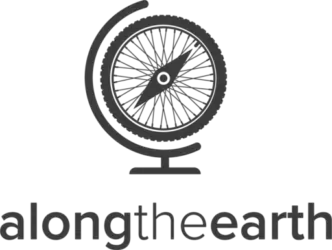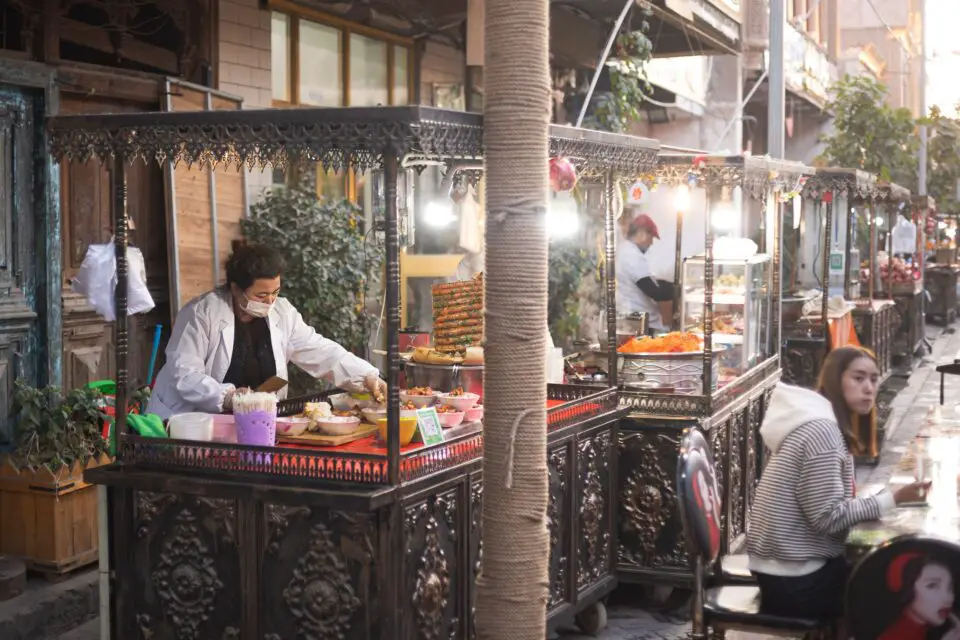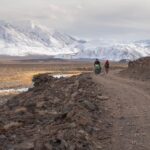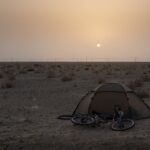Here we were, exhausted from the previous tough days out of the Bartang Valley and happy to get some well earned days of rest in the Guesthouse in Sarytash. Arriving in Kyrgyzstan, my 16th country on this cycle touring adventure, also meant that my Pamir adventure came to an end. Not only my time in the Pamirs came to an end, but It was also time to say goodbye to our so-called cycling-family, with whom I was traveling for the last two months!
Once again I had to say goodbye to awesome people with whom I went through a lot of ups and downs, adventures, and experiences cycling together day by day. Although I was a little used to it by now to say goodbye again, it was still the same shit feeling! With Favio, Andrew, Kata and Andres I shared a total of 2 full months traveling and cycling together, and now I was just about to cycle on my own again.
From Sarytash, Andrew, Kata and Andres took a ride to Bishkek via Osh and Favio cycled to Osh from where he also went to Bishkek. From Bishkek, Andrew had a flight back home to Scotland to spend 1-2 months with his family before heading back to Kyrgyzstan and crossing China the same as I planned to do. Kata and Andres however took a flight to India from where they planned to cycle to southeast Asia via Myanmar.
Favio took a longer break of several weeks in Bishkek before taking a flight to India too. Before we all left the Guesthouse in Sarytash however, we met another cyclist! It was Mickey from New Zealand. I think he arrived the day after we did in Sarytash, but he came from the other direction. As Mickey just crossed China and as he was on his way to Iran, we could exchange our experiences from our previous routes. From him, I also got some good tips for China, some yuan he had left in his wallet and recommendations on which apps to use in China.
Finally, on the 4th of November 2019 I said goodbye to the others and started cycling eastbound and towards the Chinese border. On this day, one last hurdle had to be overcome with the Irshketam pass and a 74km ride up to 3768m to the border checkpoint. Luckily the cloudy and snowy wheater from the last days got better and when I left the guesthouse, for the first time I was able to see snow-covered Sarytash and the amazing landscape surrounding the village. With a completely blue sky above me, I slowly made my way up the pass. Despite the sunny wheater, it was still freezing cold up there.
Cycling through this snowy landscape and thinking about to arrive in China in just a few kilometers and hours was hard to imagine. For such a long time and starting back in Europe, China seemed to be so far away, it was quite surreal to believe that I cycled all the way here with a 70kg bike and my own power. At that point, I almost couldn’t wait to finally cross the border and I was not only excited but also a bit nervous, hoping everything was going to be well and that they let me in.
I noticed that I arrived at the Kyrgyz / Chinese Land border when suddenly a huge line of waiting trucks started on the road. With the privilege of riding a bike, I’ve overtaken all waiting trucks and arrived at the Kyrgyz checkpoint. Two young Kyrgyz soldiers standing on a small street barricade asked me to show my passport and were more interested in seeing and counting all the stamps from the previous countries than stamping me out of Kyrgyzstan.
A few minutes later however I was able to continue to the Chinese police checkpoint just around the corner. I already heard from Mickey so as Daniel & Thea that the border crossing on the Chinese side was quite a procedure and that the actual border crossing consisted of one police- and two border checkpoints. I was also warned about carrying any knives and fuel with me. My beloved and much-used army knife I previously hid under my brooks saddle and my full 1-liter fuel bottle I left on the bike and hoped for the best.
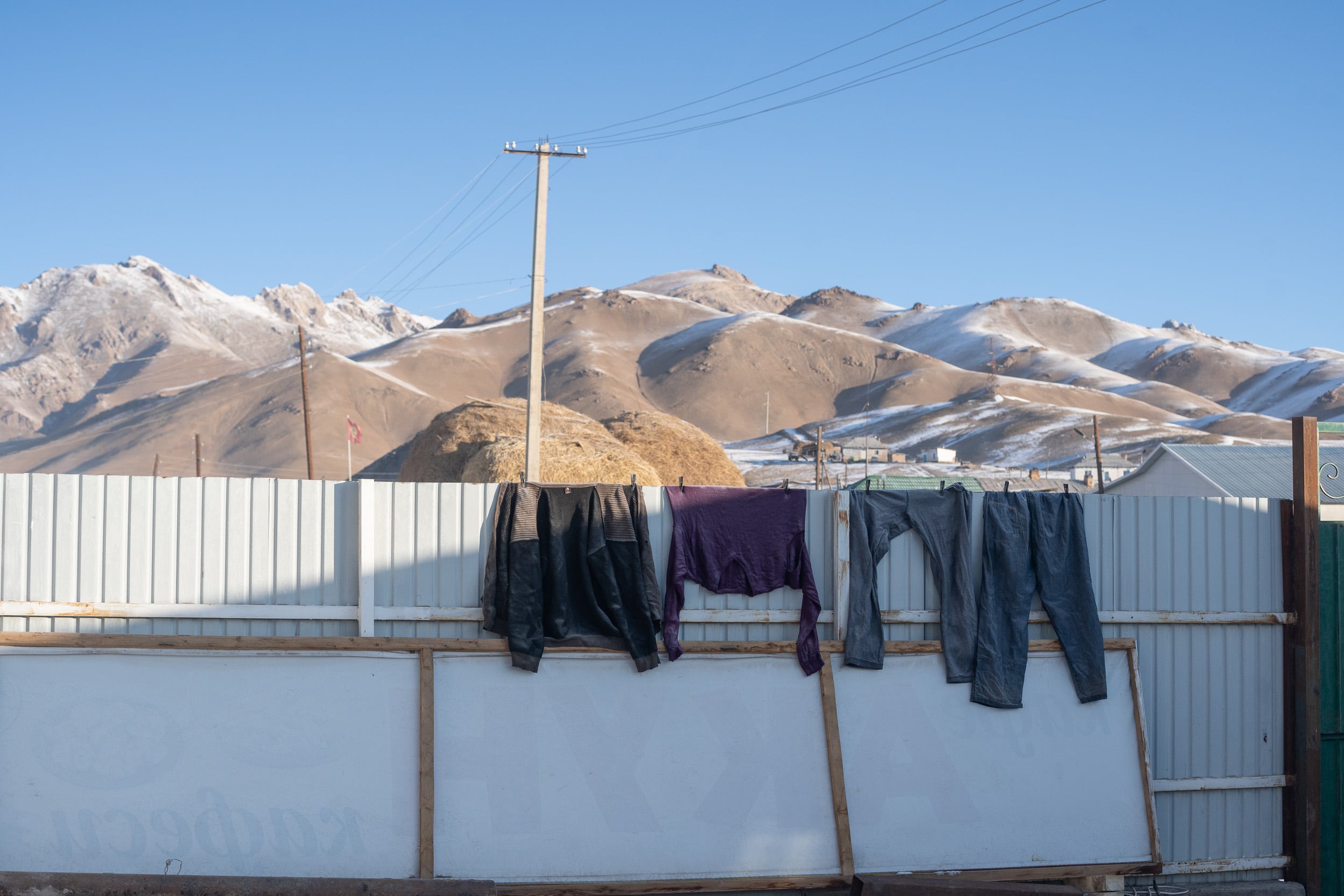

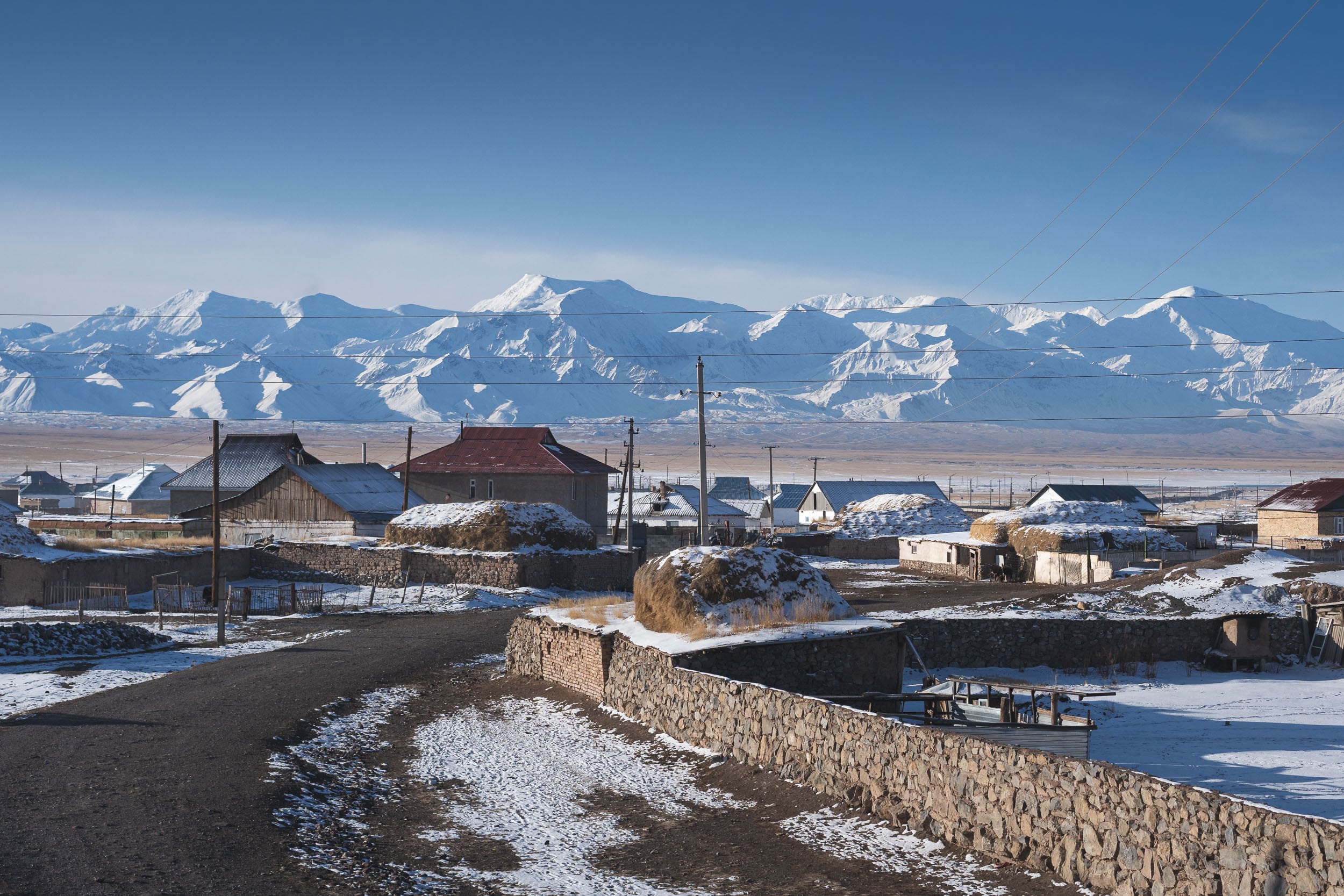

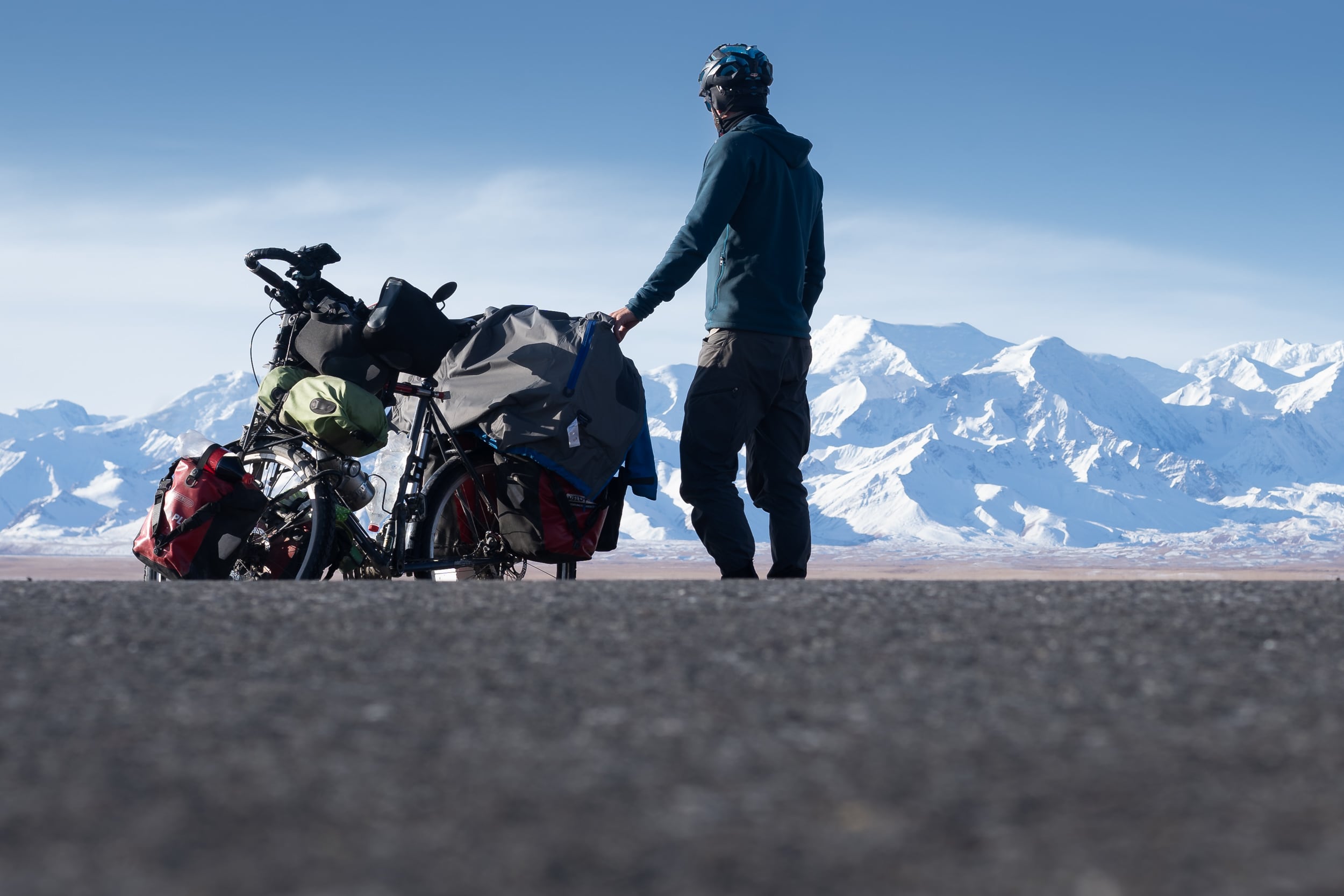

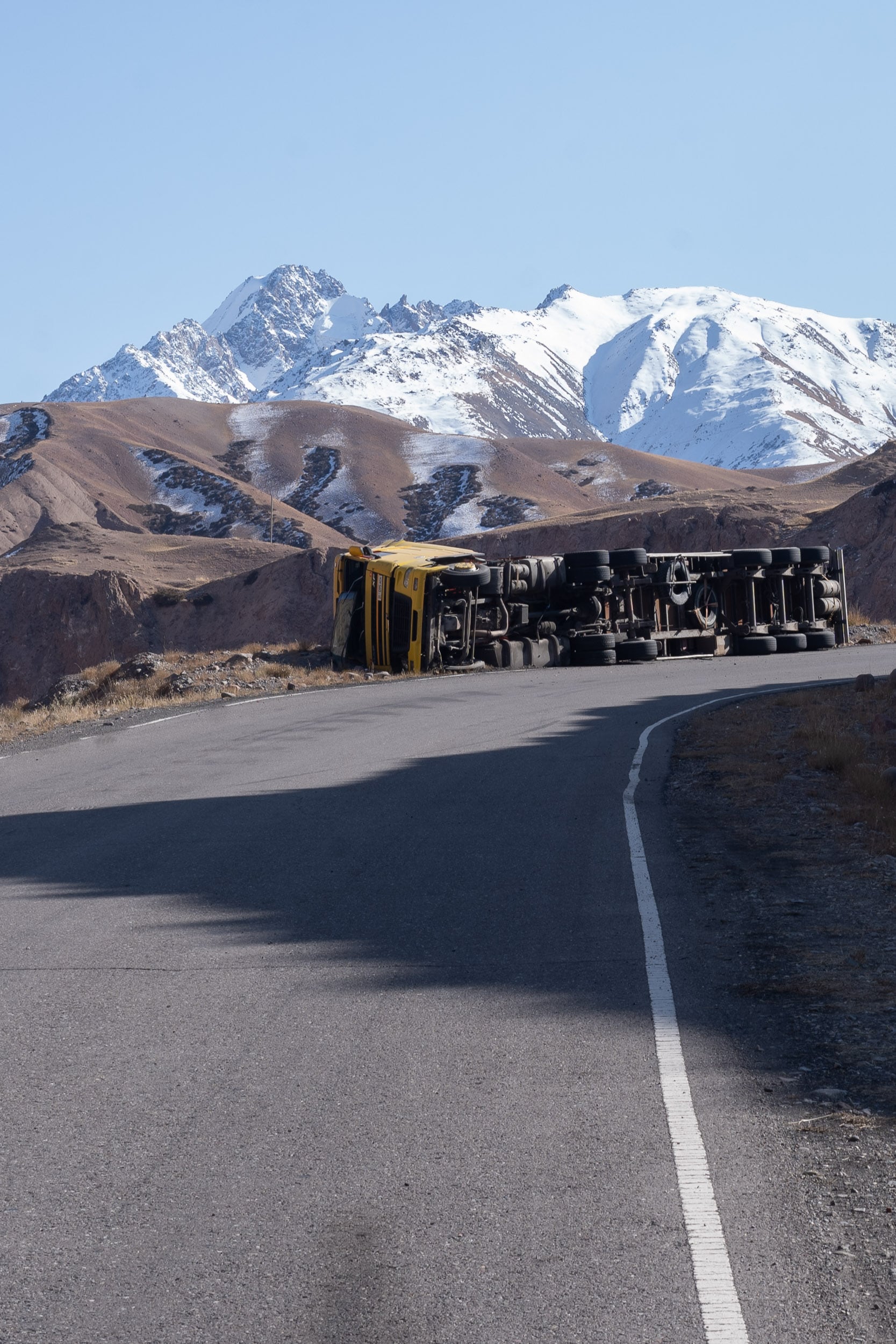

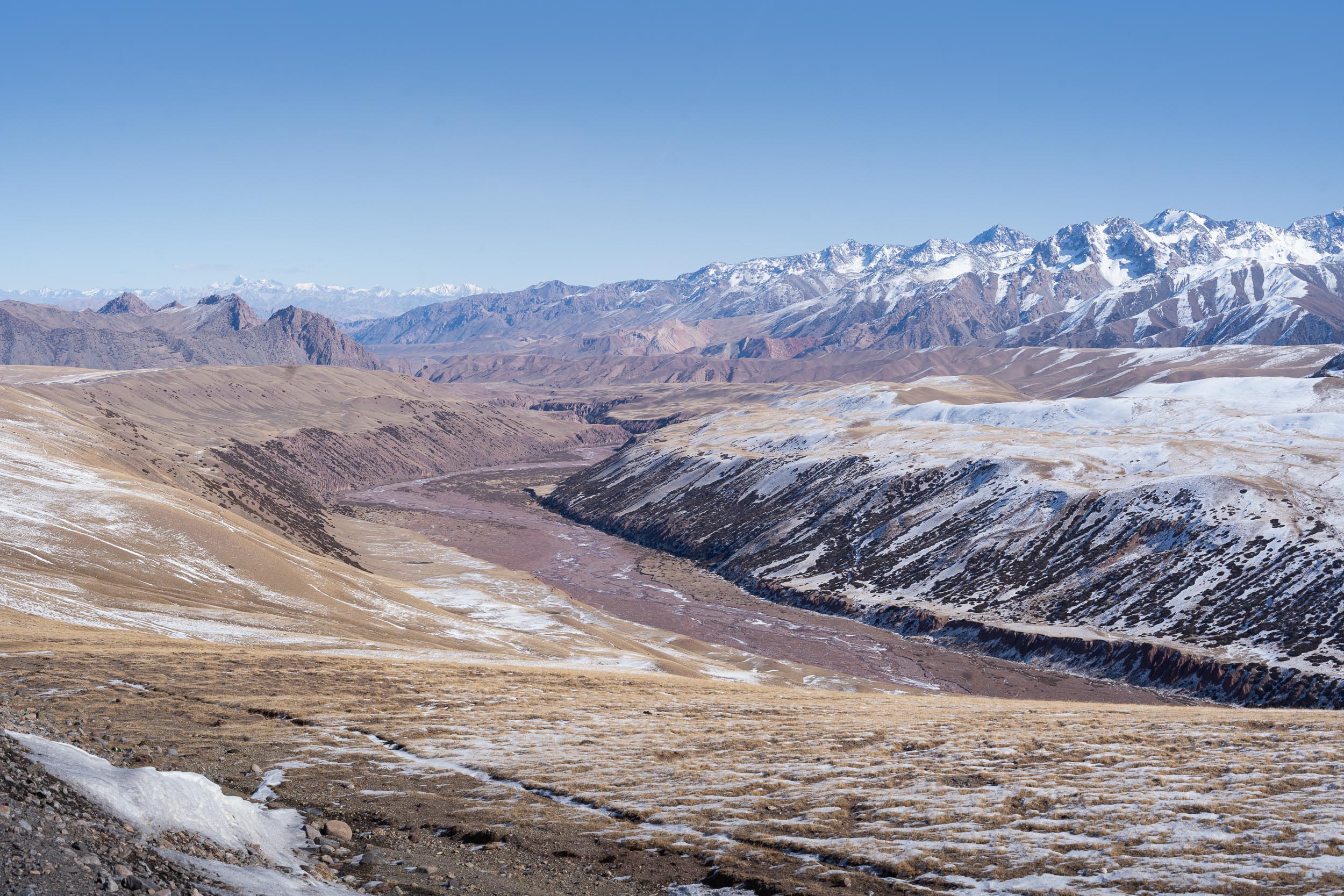

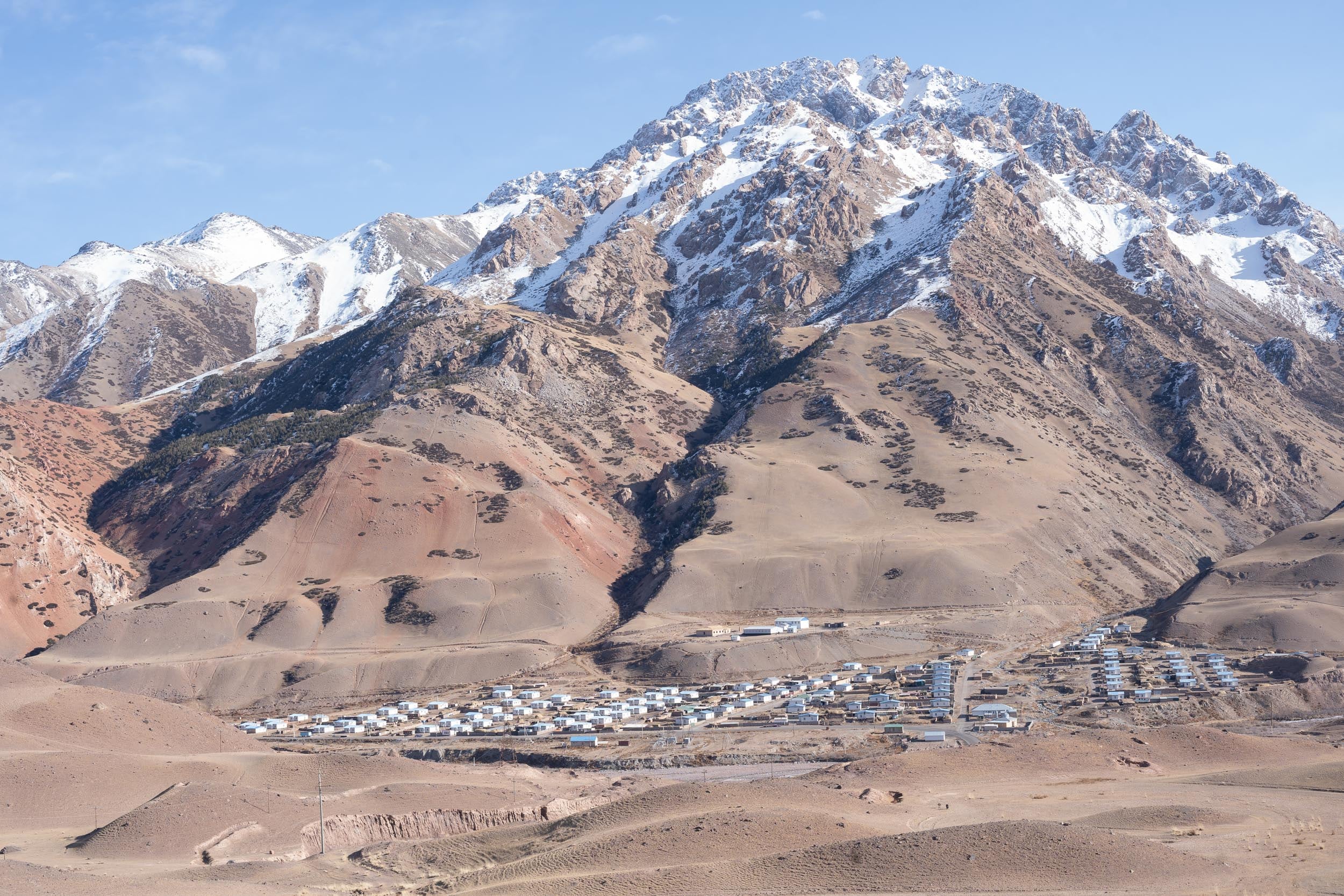

On this first tiny police checkpoint, I simply had to show my Chinese visa and was then prompted to follow a 10km stretch of road to the first border checkpoint. The first thing I noticed cycling on Chinese soil was the heavy green fences on both sides of the road. It was the first sign of how things would go on from now, here in western china in terms of freedom. The road however was perfectly paved and smooth, something to be happy about cycling in China, according to Mickey.
When I arrived at the second checkpoint, the Irkeshtam Port, I had to enter a building where there were already 4 more Chinese people waiting to be checked by the customs police. The facilities looked ultra-modern with cameras everywhere. Also, there was a huge x-ray scanner for the luggage so as a full-body scanner, even bigger and more modern as I’ve seen them at any previous airport I’ve been to.
Before it was my turn, I had to go into a waiting room until I was the last in the group to be checked. As I could leave the room, three policemen asked me for my passport and after that, I could put all my bags onto the scanner. After that, I had to open and unload all of my bags, each separately, on a huge table in front of the three. This procedure took about 40minutes and after that, I was able to leave the building again with all of my stuff. I was just happy they didn’t found the knife and the petrol on the bike so as the 1.5 liters of extra fuel I filled in an empty Sprite bottle.
After the check, they helped me to carry the bags and told me to enter the waiting taxi with the four other people already waiting in it. That I was not allowed to cycle the next stretch of 134km was something I already heard about from Karl, who entered China a few weeks before me, so as Mickey. So the Taxi driver and I played a little Tetris to put the bike and all my 7 bags into the tiny Bus and then he drove off.
As soon as we were driving, all of the men, including the driver, started smoking cigarettes on the bus. One of the men was watching videos on full volume on his smartphone, while another one was munching snacks in probably the same volume. Here I had it, my first taste of western China, a culture shock right in my face. It was repulsive and exciting at the same time and I almost had to laugh a bit, not sure cause of the situation or because I was super tired.
Suddenly it occurred to me that I no longer had my passport in my pocket until I realized that the three policemen didn’t give it back to me and that out of sheer excitement I forgot to ask to get it back. Immediately all sorts of scenarios went through my head. “How can I tell the driver that I forgot my passport up there, we were already driving for almost an hour”. “What happens when I can’t show them a Passport on the next Checkpoint”.
It was a pity I couldn’t cycle this part, as the road was leading through stunning mountains, from about 3000m down to 2160m and the town of Ulugchat. There we had to enter the main and last customs checkpoint and when we left the bus, to my reassurance, the driver handed me over my passport. After about an hour of waiting around, they x-ray scanned all my bags so as checking my passport and other papers again. Afterwards I had to join three other policemen to answer about a 30 minute interview: “Why do you want to travel in china”, “which countries did you cycle through previously”, “where are you going next”, where do you sleep the next days” etc.
subsequent to that, I had to pay the taxi-driver for the ride and to get my passport back and finally, at 20:00 pm, I officially entered China and was able to leave the third Checkpoint. Fortunately, there was a hotel just next to the police station, one which was mainly used by truck drivers. For about 50 yuan (or 8$) I got a room and as I couldn’t find a restaurant nearby, I probably ended up having the most clichéd first dinner in China, two packs of instant noodles I prepared with hot water from the water heater in the room. The best thing however was the hot shower, the first “real” shower since two weeks.
The next day, a few hundred meters next to the hotel, I entered the G3013, the Kashgar- Irkeshtam Expressway. The G3012 / G3013 is the new road they’re building from west to eastern china and which runs along with the existing G315. Just a few kilometers later after cycling on a perfectly flat and smooth highway, I’ve already arrived at the first road checkpoint, which appears approximately every 20-50km’s on the G315 and every 50-80km on the G3013.
The oppression of the Uighurs
To understand why there are so many police checkpoints along the highways, cameras everywhere and metal detectors in front of every shop, you need to know why Xinjiang became one of the most intrusive police states in the world and why the situation with the Uighur people is one of the biggest crimes against human rights on our planet at the moment.
To keep it short: The Uighurs, a mostly Muslim ethnic minority, make up around 50% of Xinjiang’s population. More than 1 Million Uighurs have been put in prison or so-called “re-education camps” with the aim of expelling their Muslim culture. The IJOP platform tracks everyone in Xinjiang. It monitors people’s movements by tracing their phones, vehicles, and ID cards. It keeps track of people’s use of electricity and gas stations. Almost everywhere you go in Xinjiang, you’re tracked by cameras and at every of these Police Checkpoints on the highways, the people of all vehicles have to enter the building for being checked via face detection and their id-cards.
Here are some more detailed articles about the situation in Xinjiang:
https://www.businessinsider.com/xianjiang-province-china-police-state-surveillance-2018-7?r=US&IR=T
https://www.bbc.com/news/world-asia-china-48130048
https://www.hrw.org/video-photos/interactive/2019/05/02/china-how-mass-surveillance-works-xinjiang
https://www.pbs.org/newshour/features/uighurs/
https://www.bbc.com/news/world-asia-china-50511063
Anyway, at all of these police checkpoints along the road, I had to enter the building, showing my passport, explaining my previous and future travel days, explaining where I’m going to sleep that night so as standing still for a picture of my face they made with their smartphones. Fortunately, I previously got an offline map for MapsMe from Daniel and Thea, so I was able to see all the upcoming police checkpoints along the road.
Although these checkpoints were annoying after time and though they cost some valuable time with otherwise short days on the bike, they also offered a stop to get some hot water along the road.
About 60km later after passing my first police checkpoint on the road, I finally arrived in the city of Kashgar.
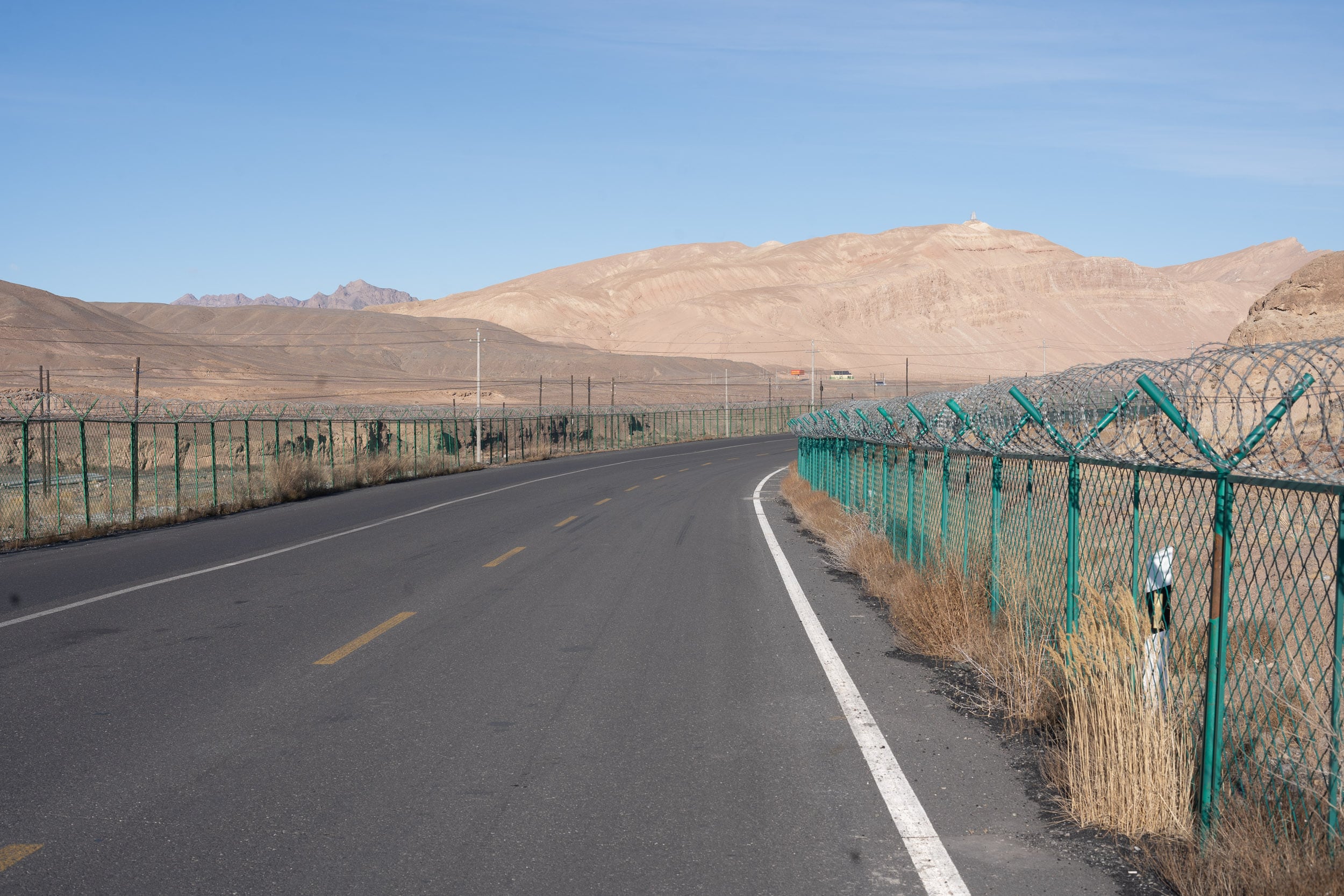

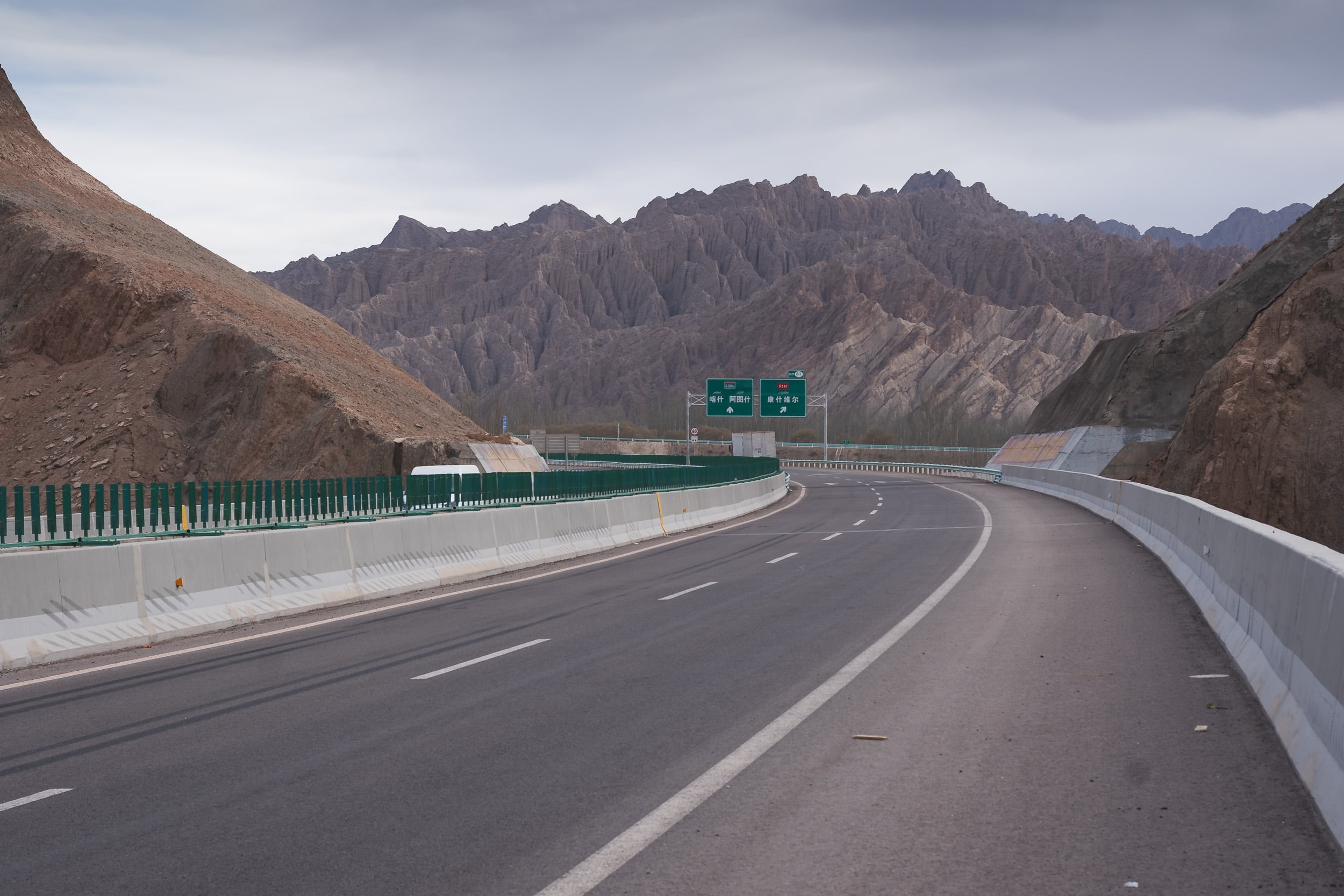

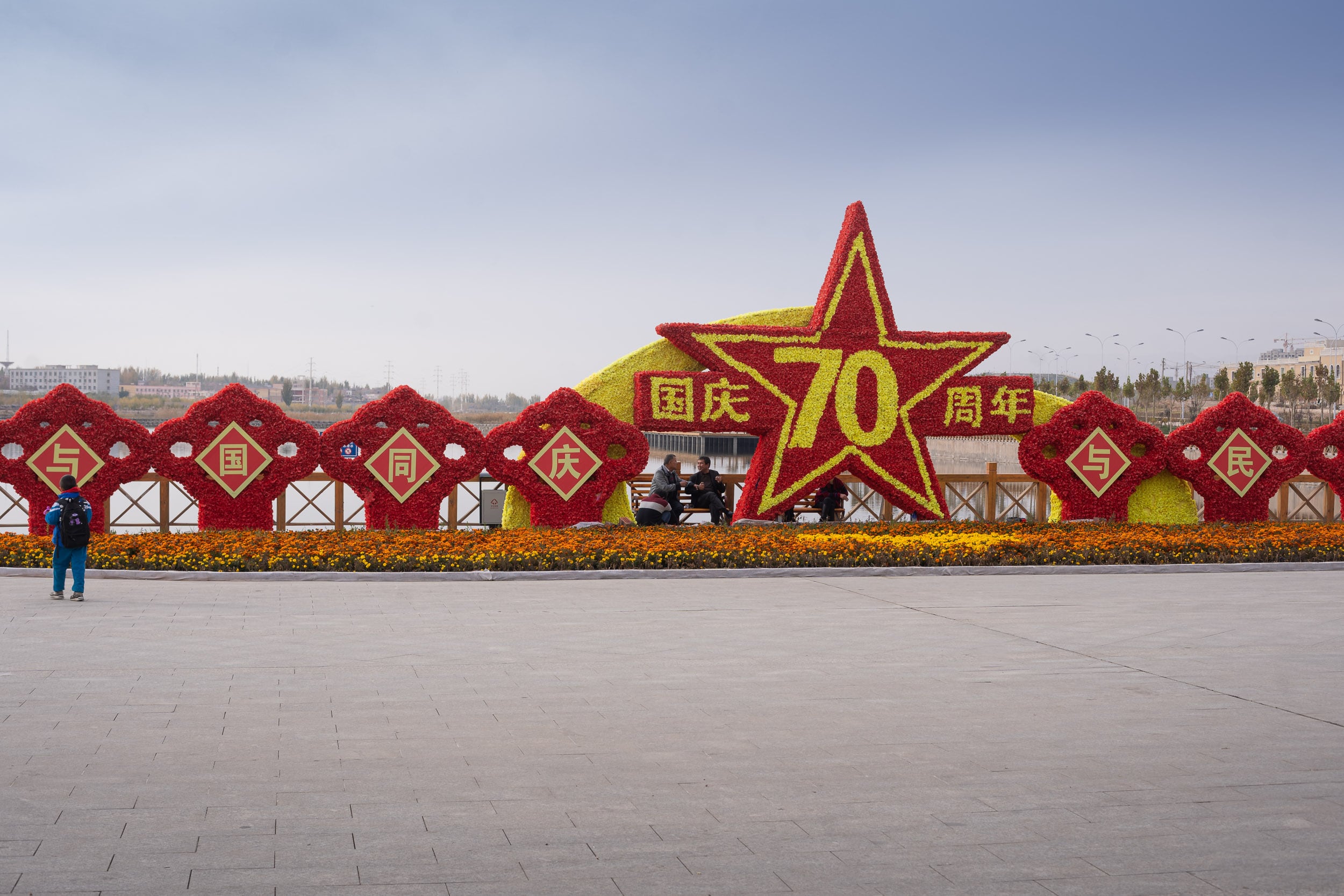

Kashgar, oasis of the old Silk Road
Kashgar is one of the most important cities of the old Silk Road, an oasis in a mountainous and desert area. In the city of Kashgar, I stayed for a full week in the great Pamir youth Hostel, 5 days longer than planned, to get some more rest and eating as much new food as possible. Here they were again, the spices, the flavors, vegetables & fruits! Kashgar was a paradise in this regard, after a “too long time” with bland and meat-heavy food in central Asia.
Though, as I was in the western Uygur autonomous region of Xinjiang, a region mainly populated by Uyghurs, there were still a lot of influences from the central Asian cuisine and culture and there were still Somsas and Plow to be found.
Kashgar was not only a big change in terms of food. Using English was definitely not an option anymore and google-translate became my daily assistant. Latin and Cyrillic alphabets turned into Chinese characters and spoon/fork gave way for the chopsticks
There was such a special atmosphere in Kashgar. When I think back, being on the huge balcony of the hostel, watching the sunrise, and drinking hot coffee, was definitely one of the most special and memorable things on the whole trip. The atmosphere there was so calm, despite the size of the city and the huge amount of people. For the first time, I really felt far away from home, feeling this kind of inner satisfaction I made it all the way here and a thirst for new adventures through China.
The streets of Kashgar were full of new and tasty street food and the weather during the day got warmer too. Sometimes during the day, I was able to wear a t-shirt again. In the Hostel, and though it was not high season anymore, I met a lot of other travelers, most of them from eastern China, so as Tree, a Chinese cycle tourer who cycled China and other countries during the last 3 years. On my first night at the hostel, a group of Chinese travelers invited us to have dinner with them, traditional Chinese hot pot on the balcony. On this first night, I also met two guys from the United States with whom I spent some time drinking beers, whisky, and playing cards until late at night.
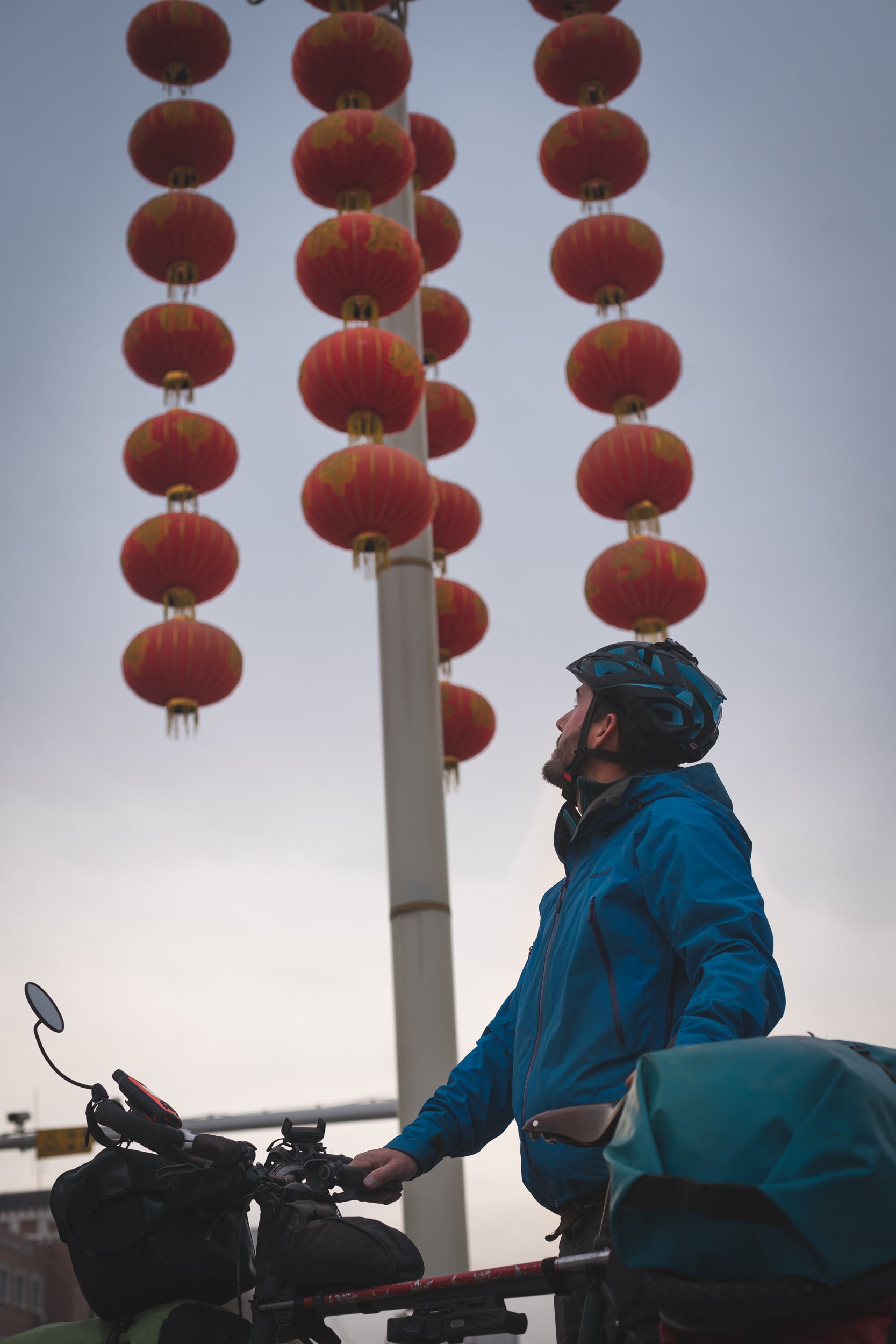

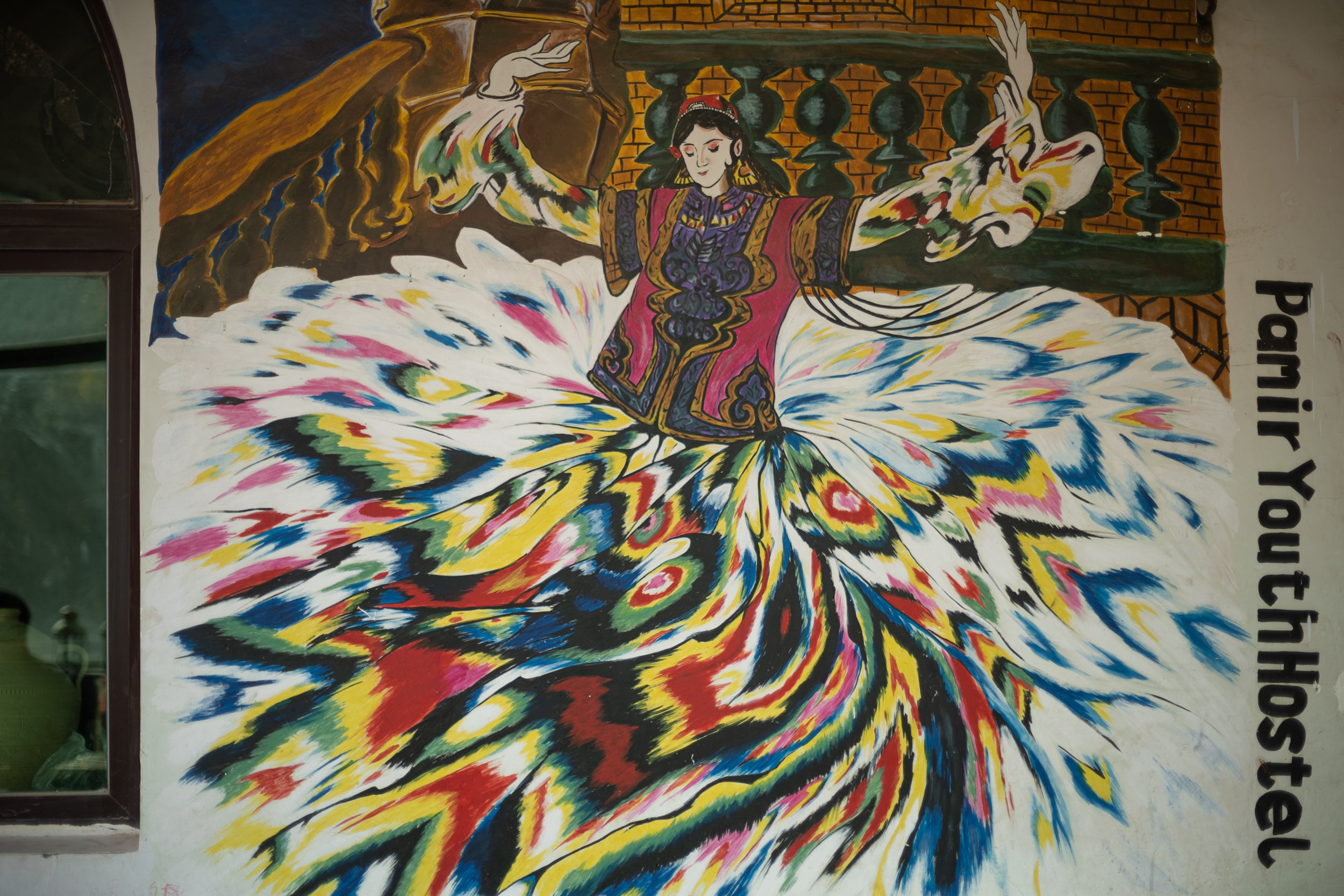



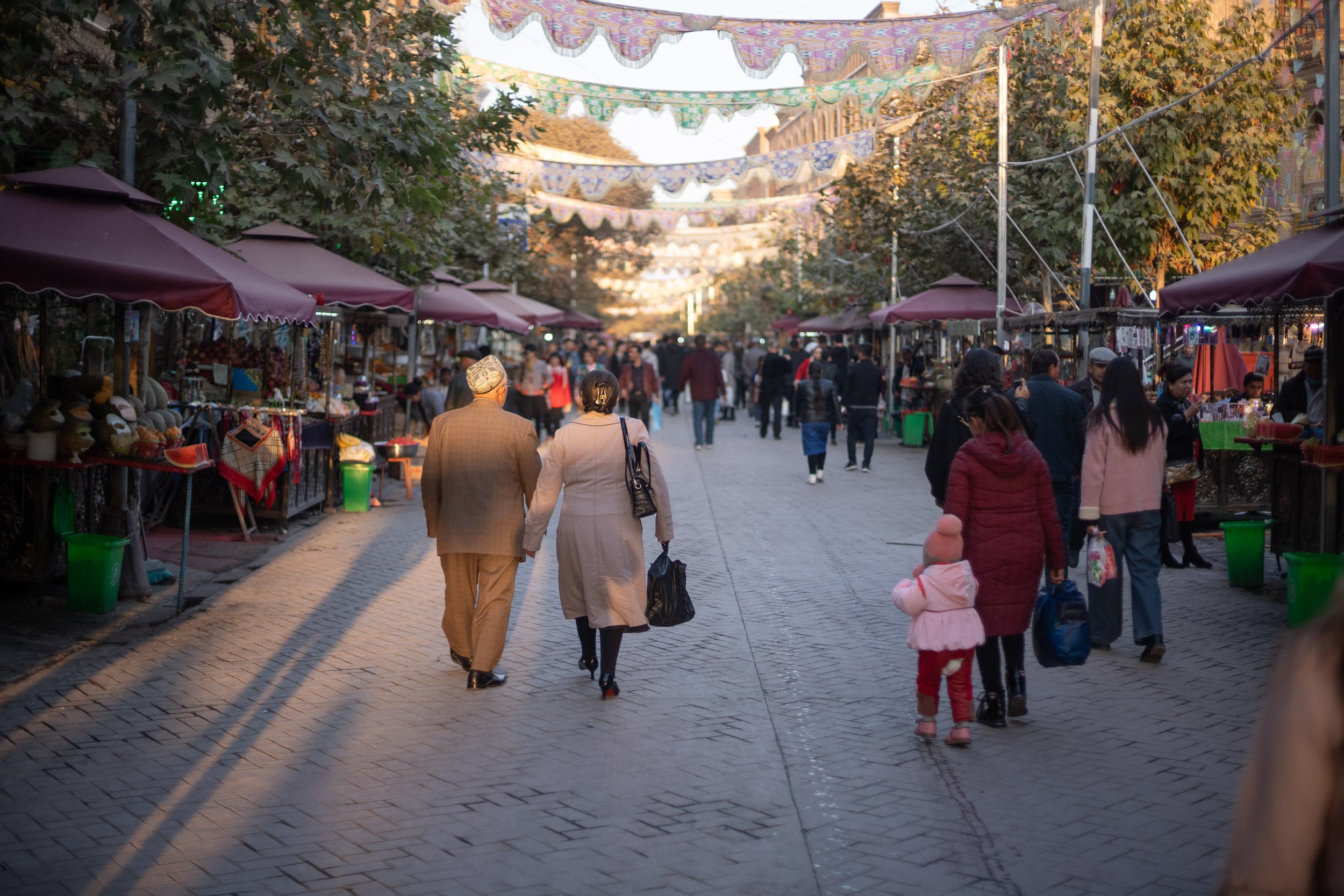









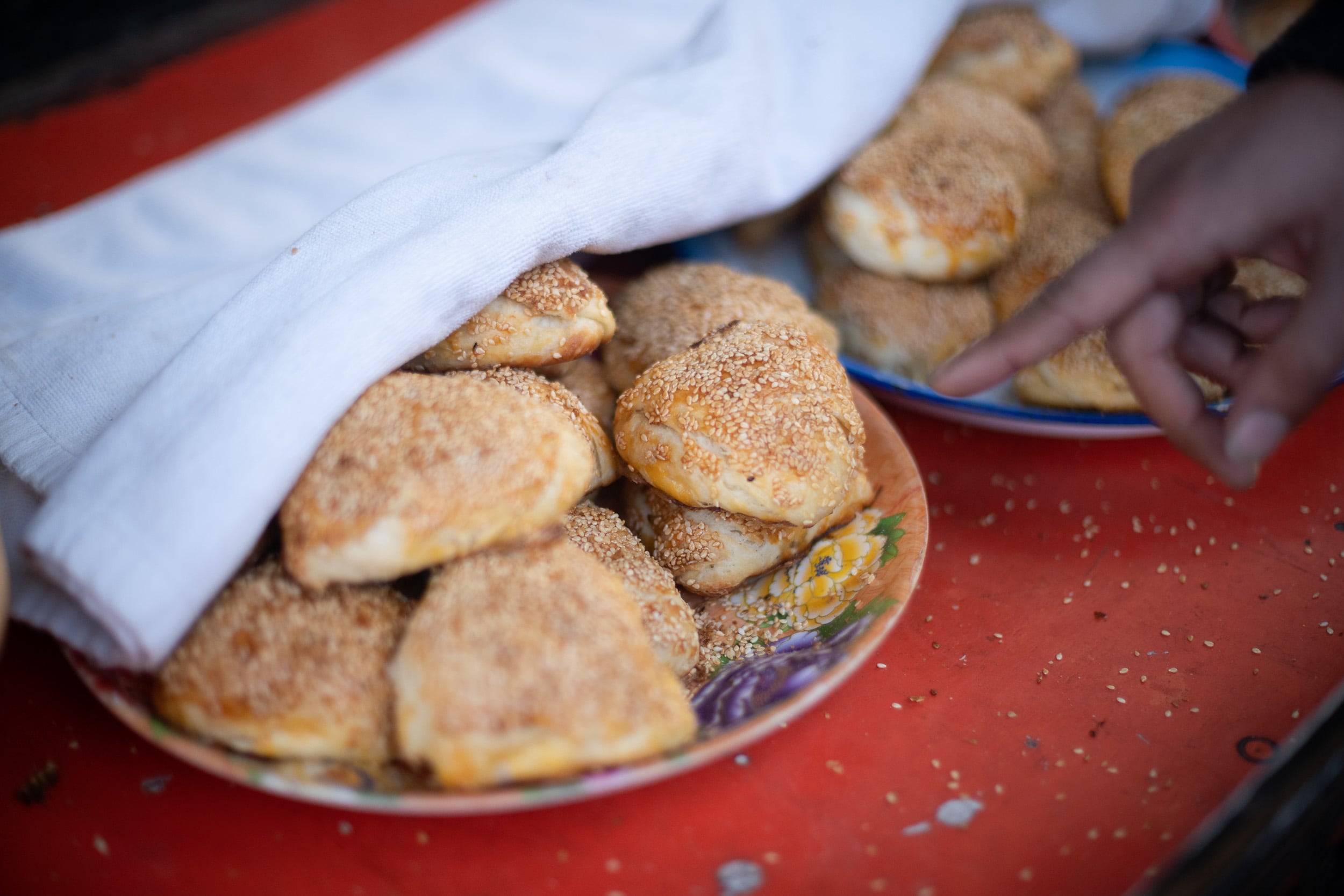

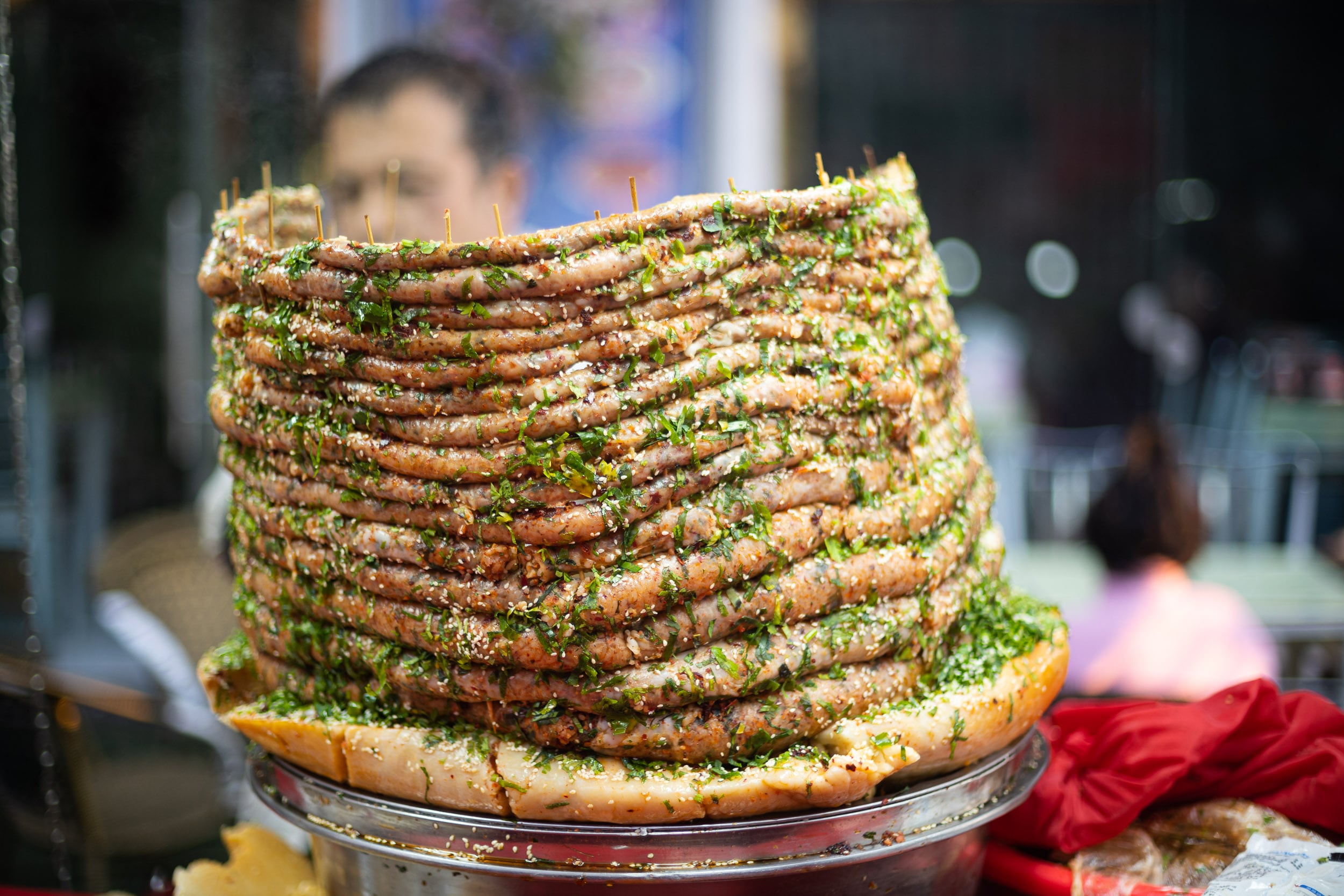

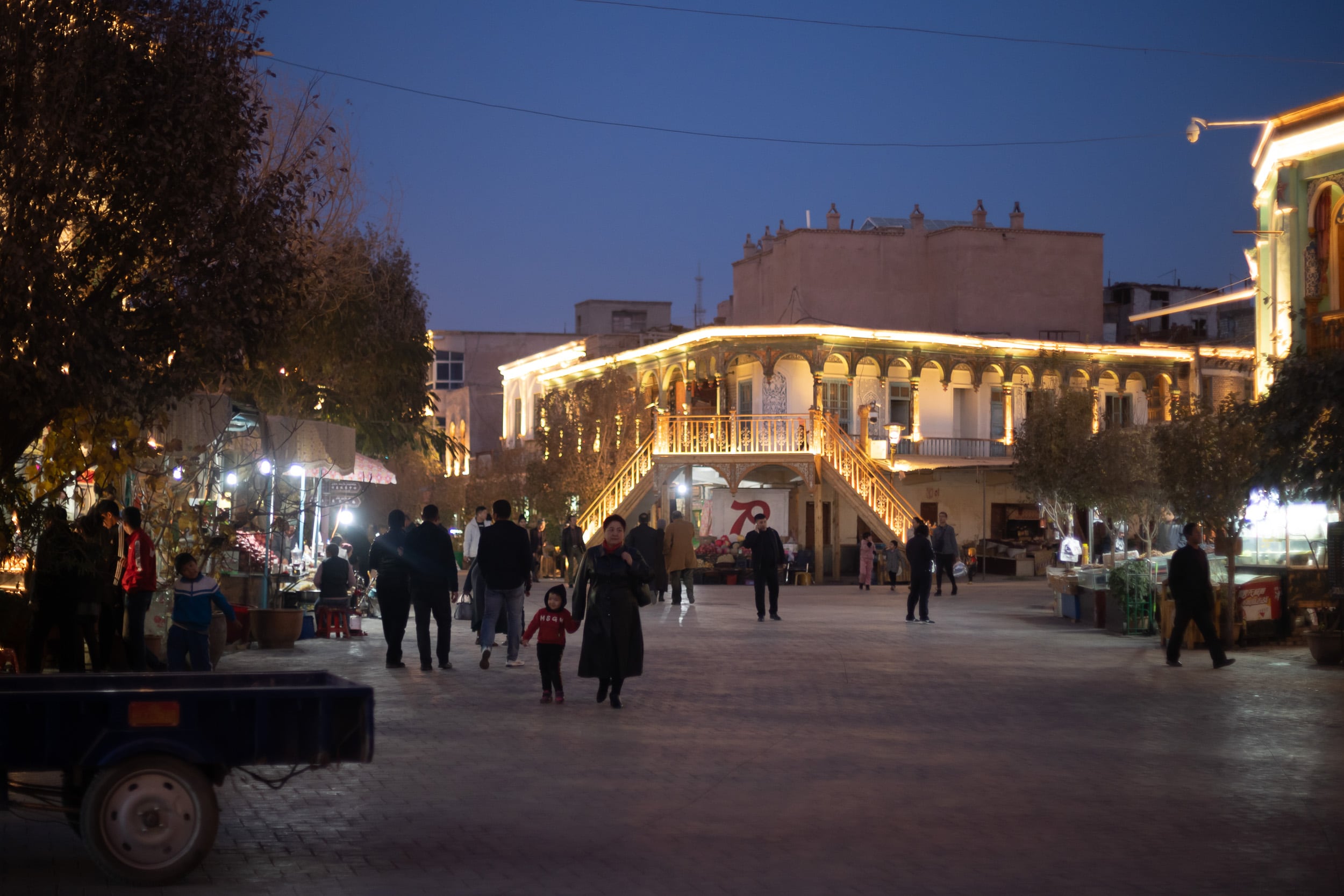

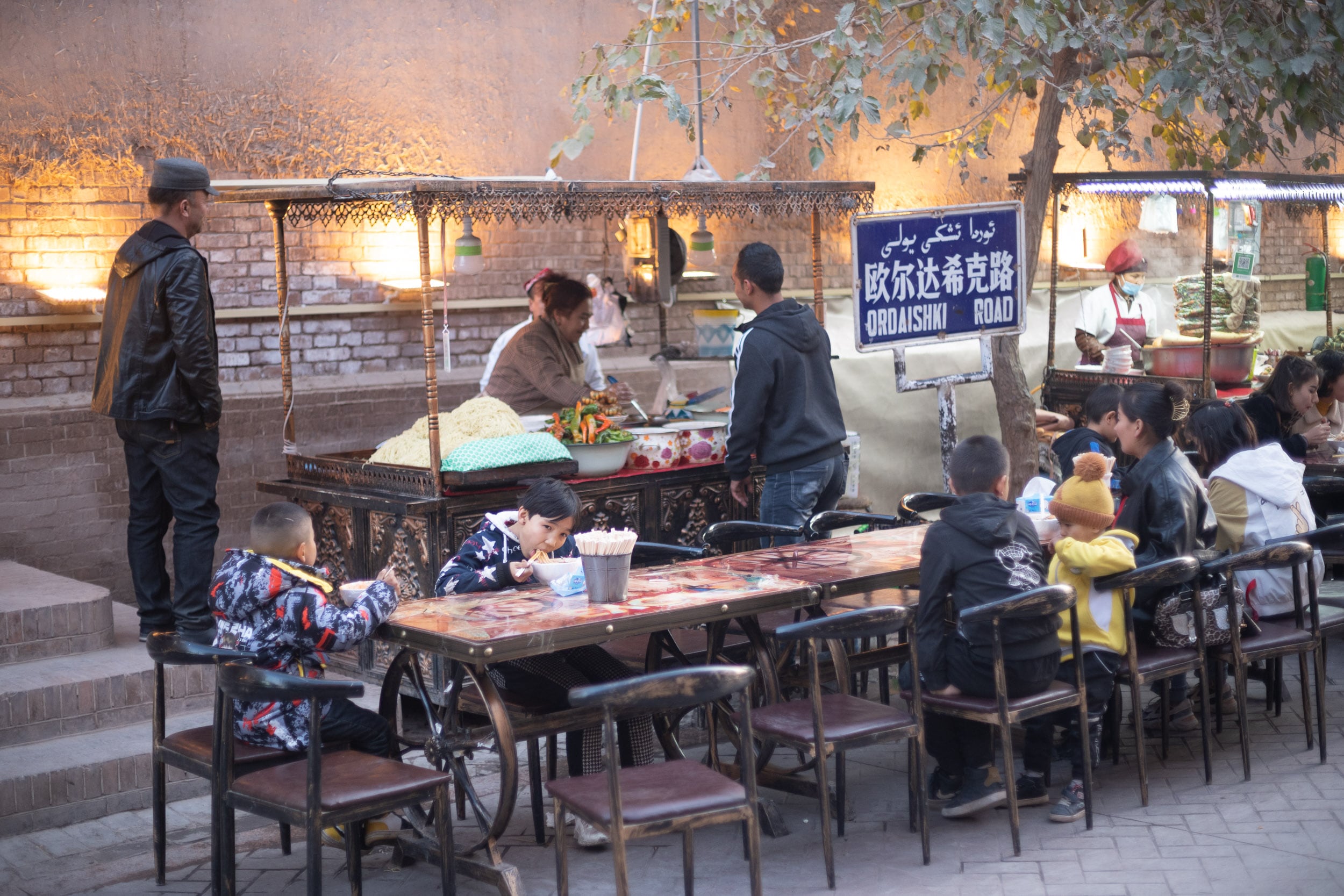

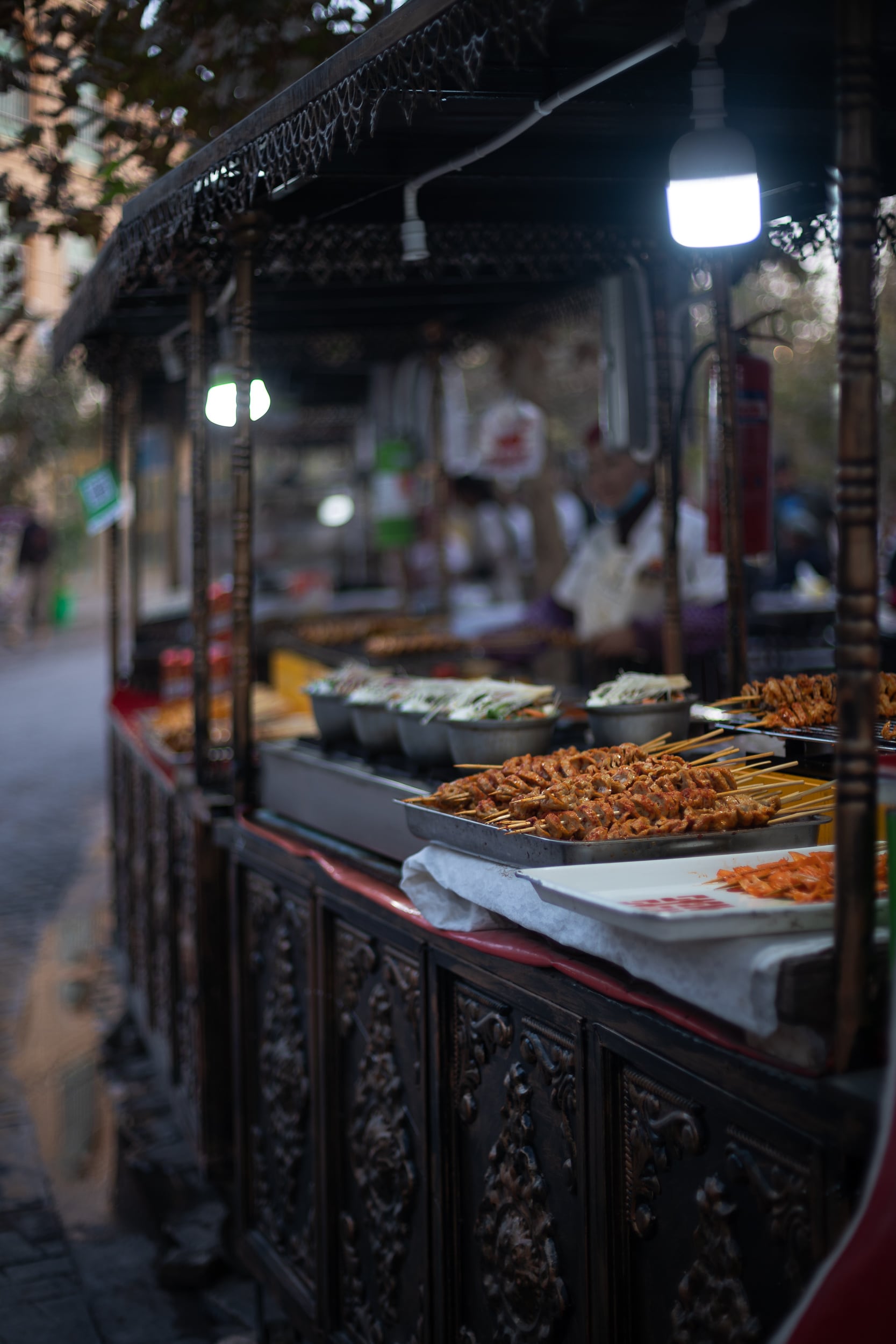

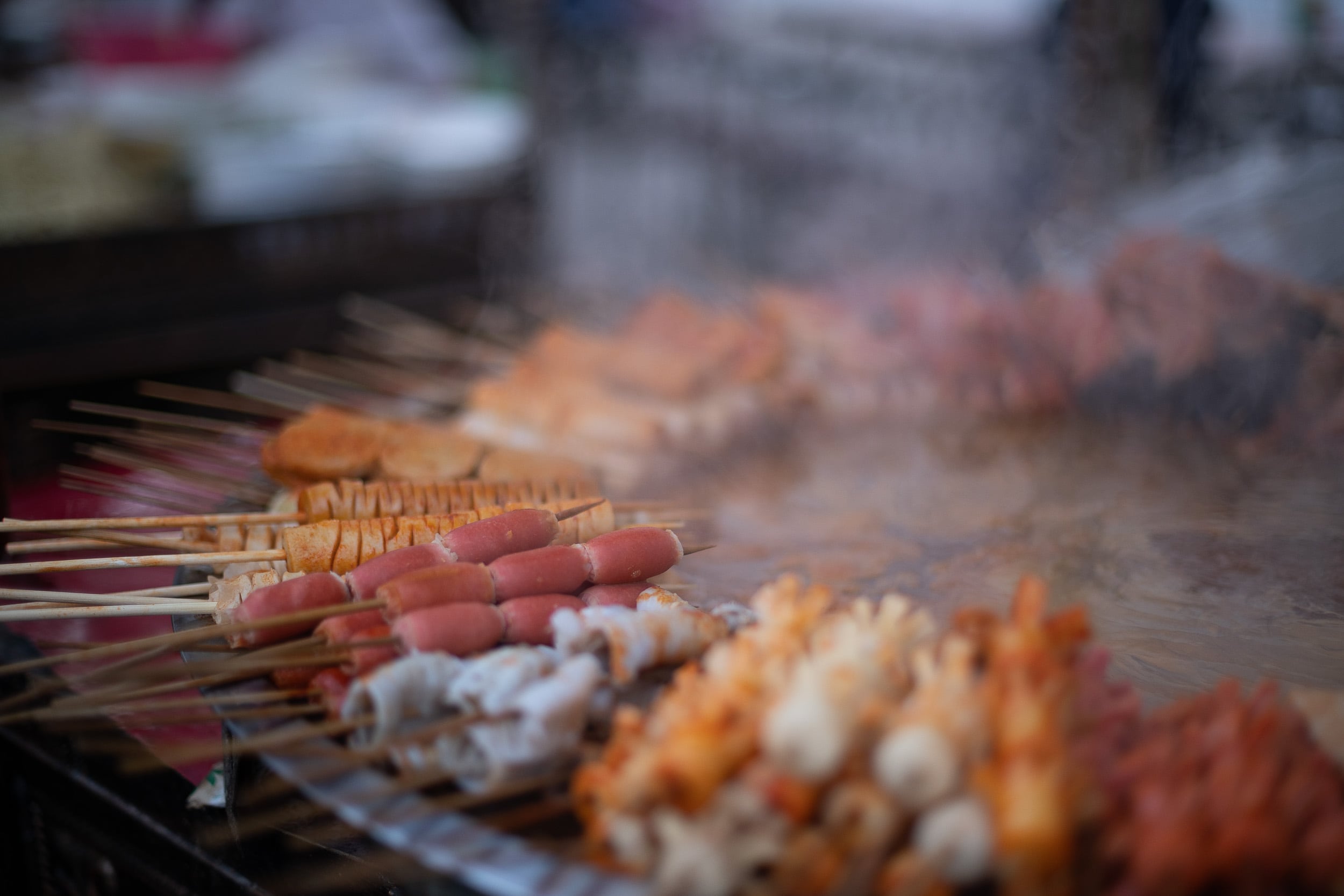

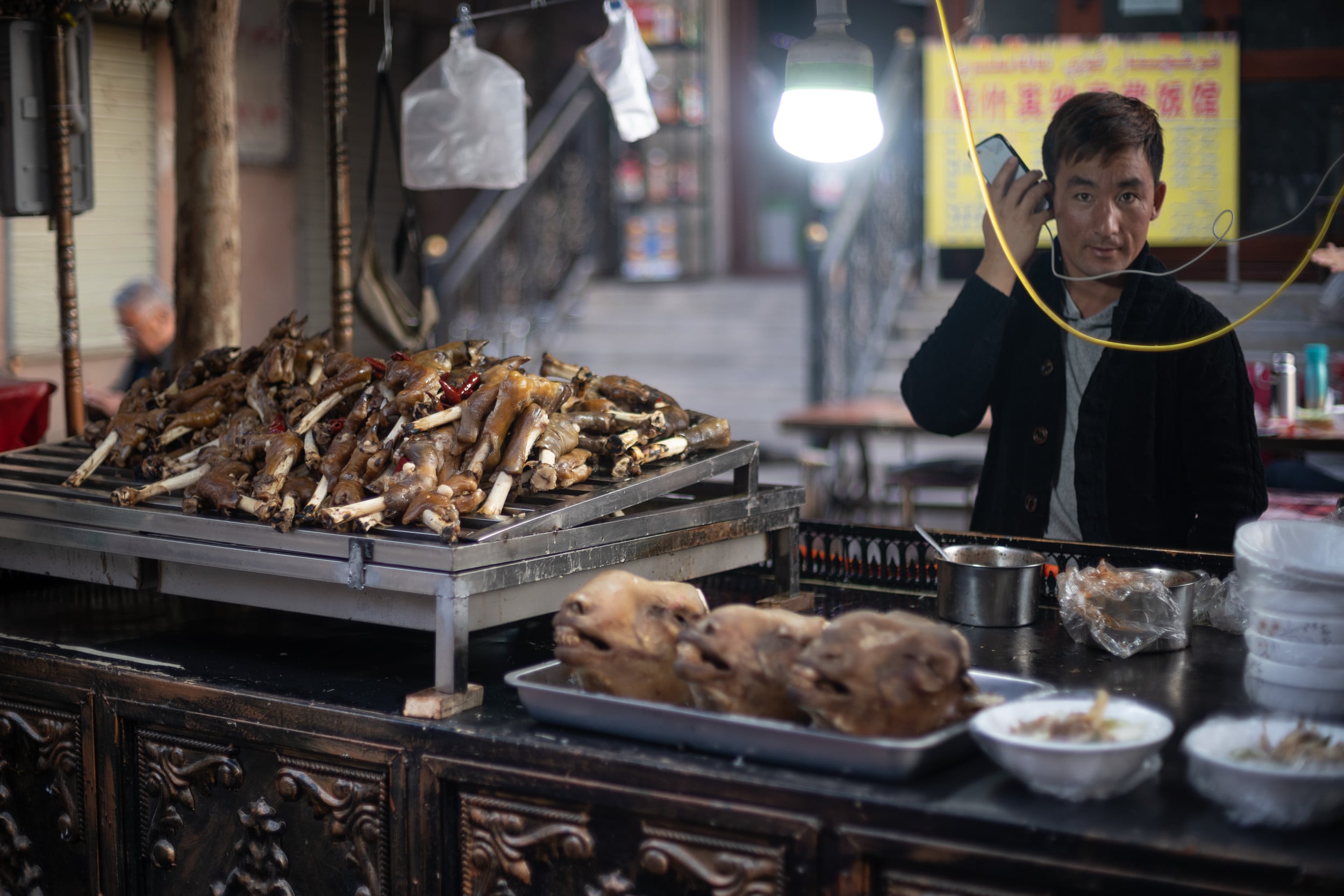

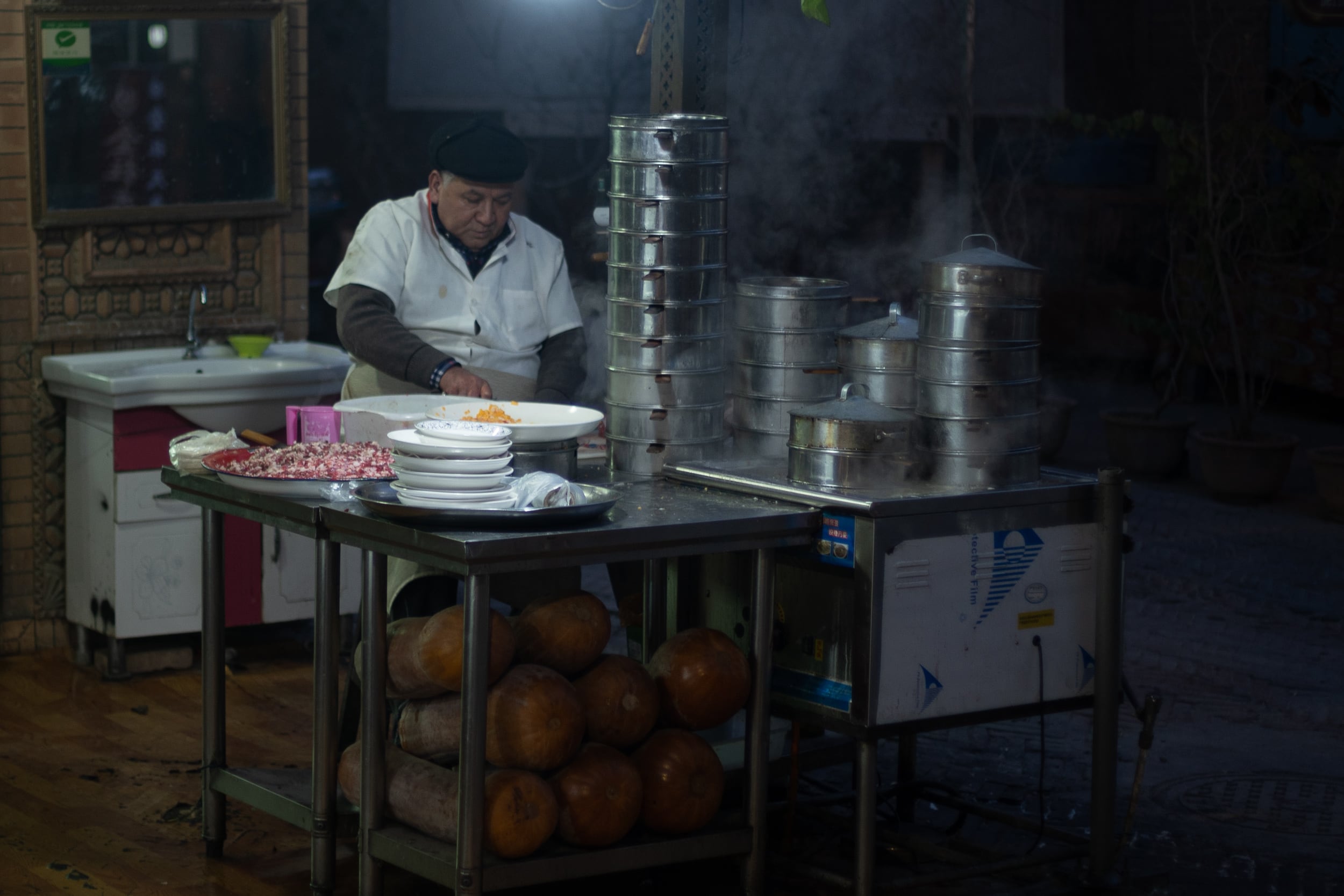

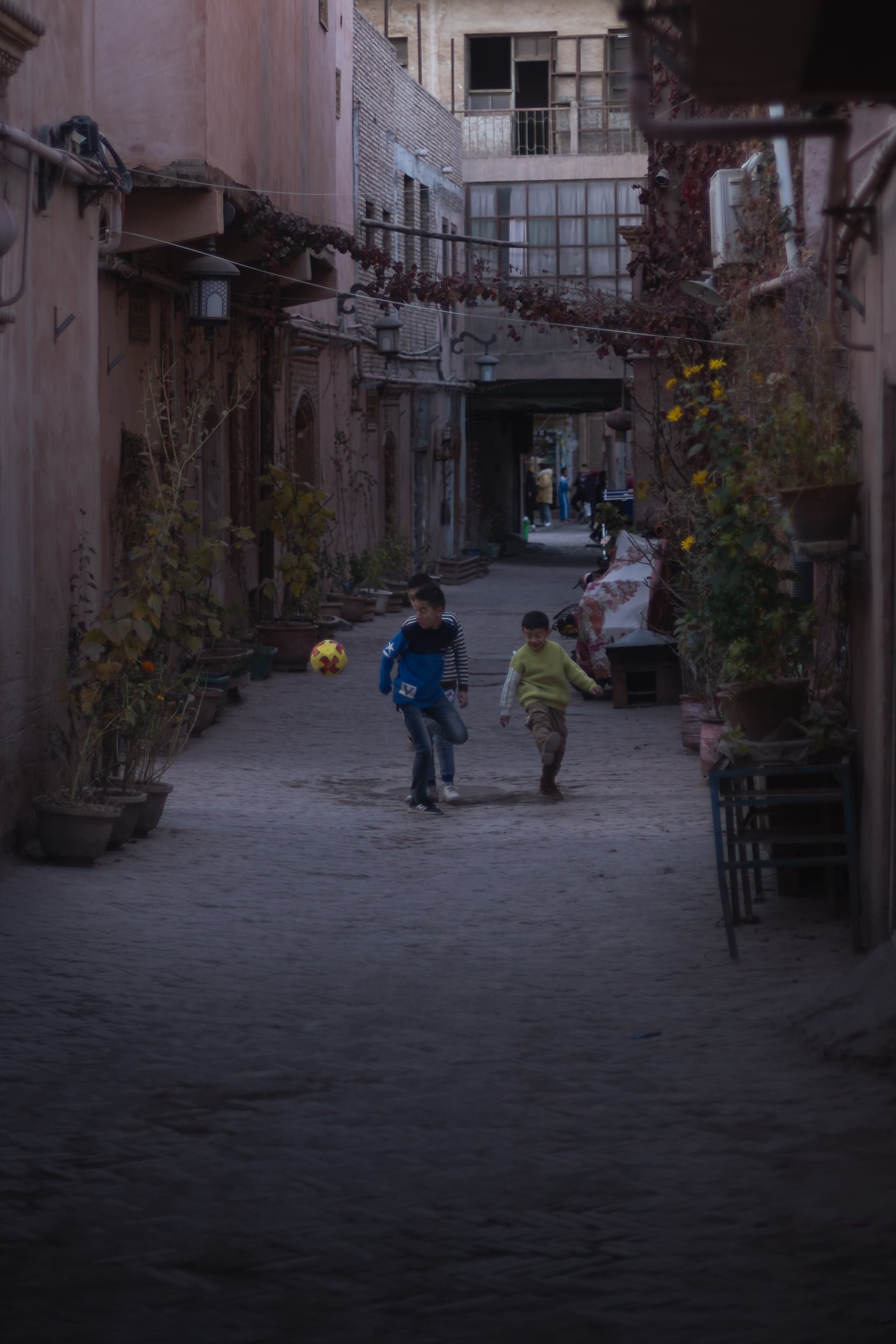



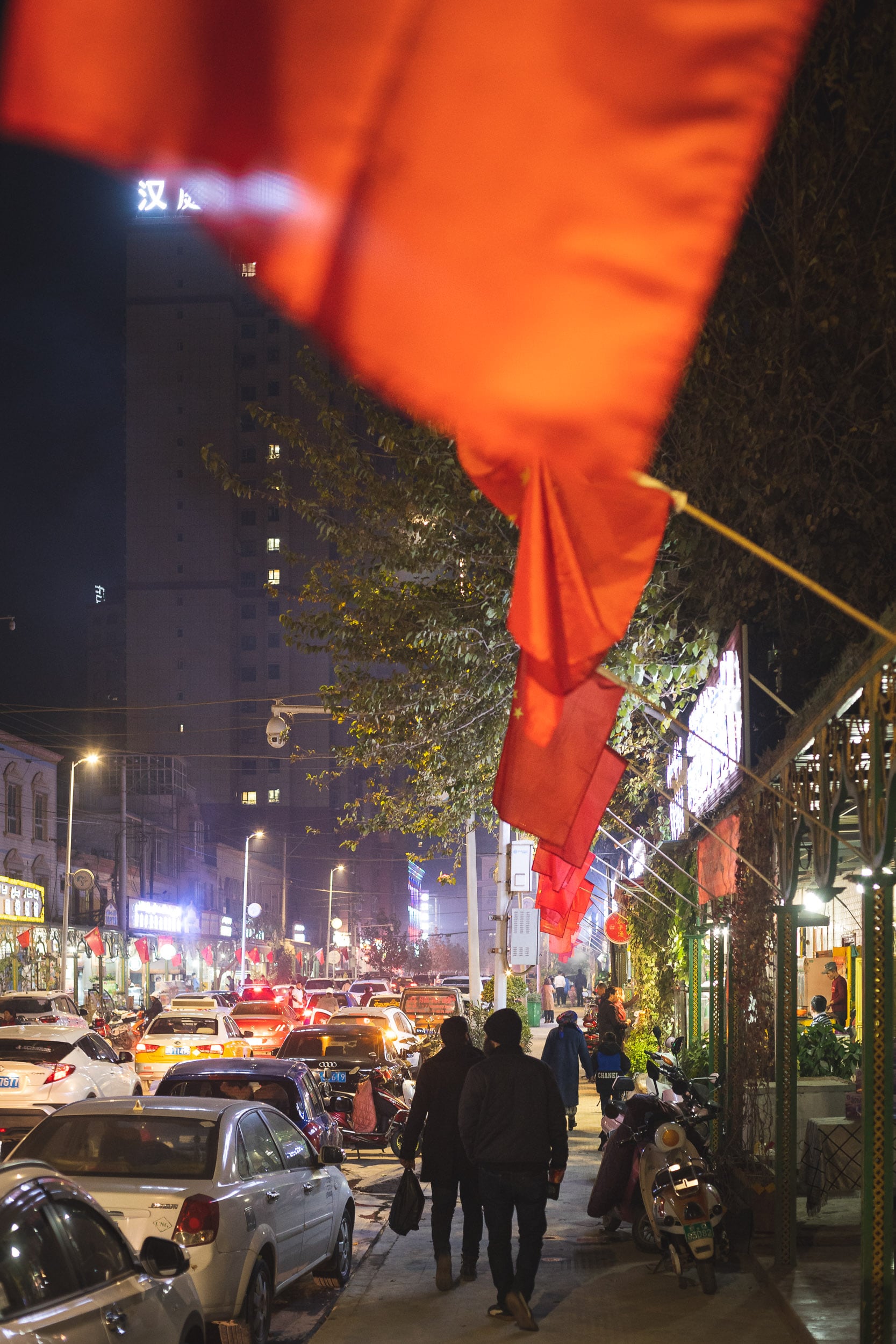

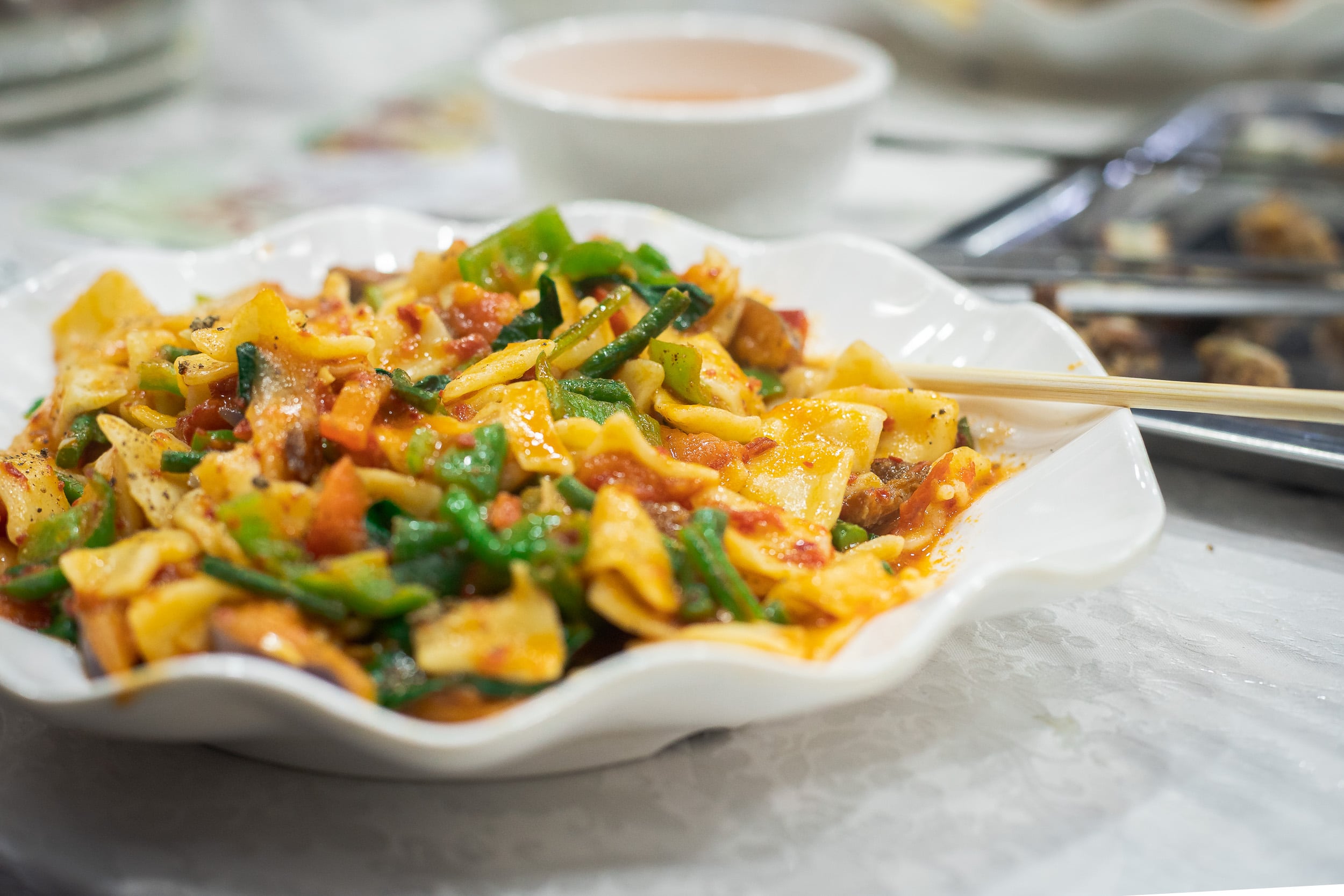

Kashgar Markets
After too little sleep and still hungover, the three of us took a taxi to visit the two most important markets of Kashgar, the livestock market which takes place every Sunday, so as the Kashgar Sunday Bazaar, a meeting place for merchants, locals, and travelers for years.
While traveling and seeing a lot of new things and places, not all things are as you would like to see them! The livestock market in Kashgar was one of them.
Although ranked as one of the main attractions in Kashgar, the way animals were treated there was depressing to see. Farmers were kicking their cows into/out from too small transporters, sheep were held in massively crowded fences or dozens of sheep were tied together, head by head to a wooden slat, not able to move in any way.
Nevertheless, I’m happy I’ve been there! It’s a big part of the local culture and there was a lot of busy/social life going on. On a long journey like this, and next to all the great things I experience, there are also these ones I’m not happy about, things like environmental pollution, forced labor, racism, or everything else which is against human & animal rights.
Though, It’s also important not to look away from those, learning from them and doing it better ourselves.
Kashgar was once one of the most important stops along the Silk Road and became a center of trade with one of the largest ancient markets. The Kashgar grand market is one of them, ranking as one of the largest in Asia. At this market, you could find almost anything. From clothes, spices, insulated bottles, street food to more absurd things like dried snakes or frogs which are sold as aphrodisiacs.
It was quite interesting to walk around the small streets of this huge market and to imagine, how east and west once exchanged their culture so as their goods.
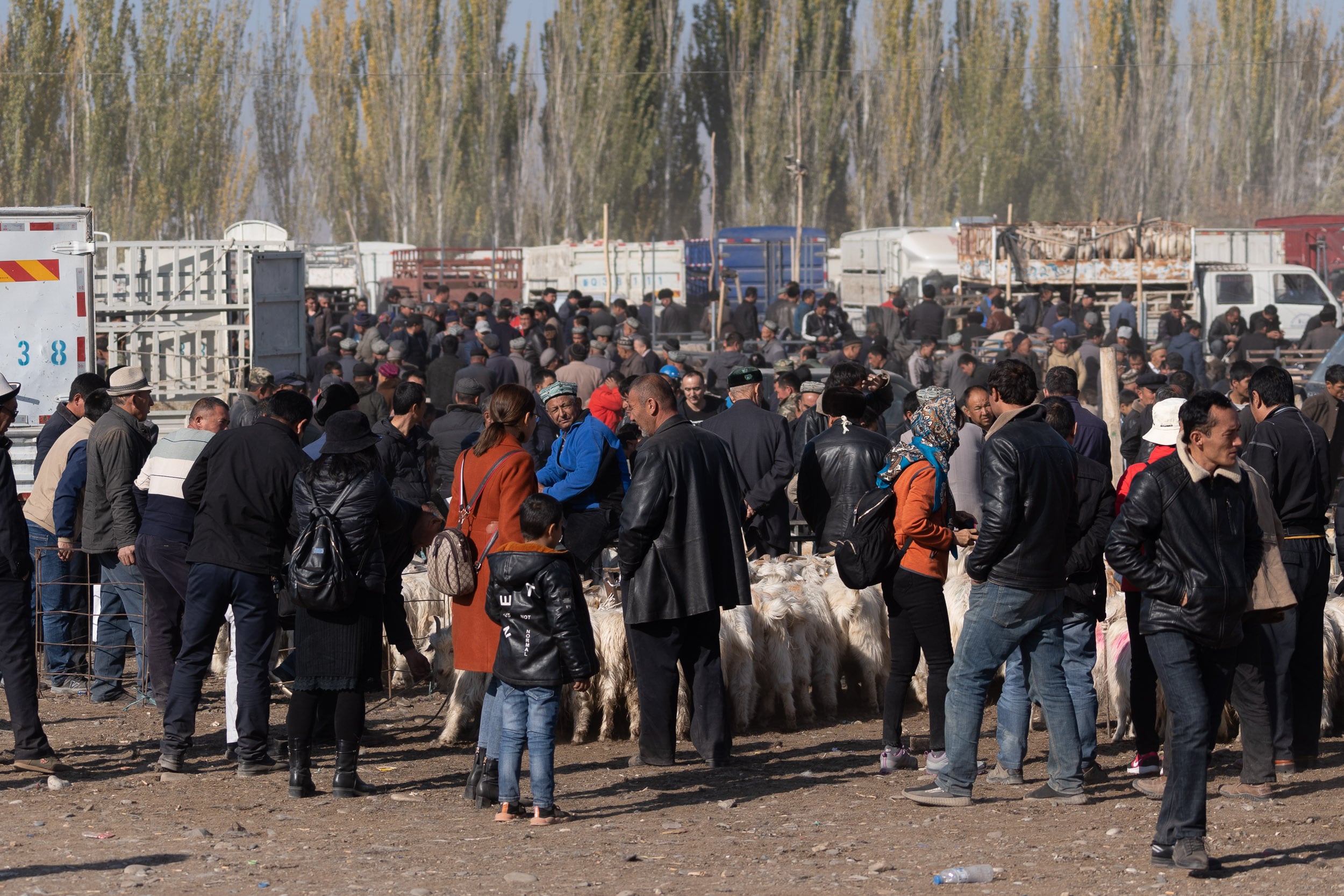

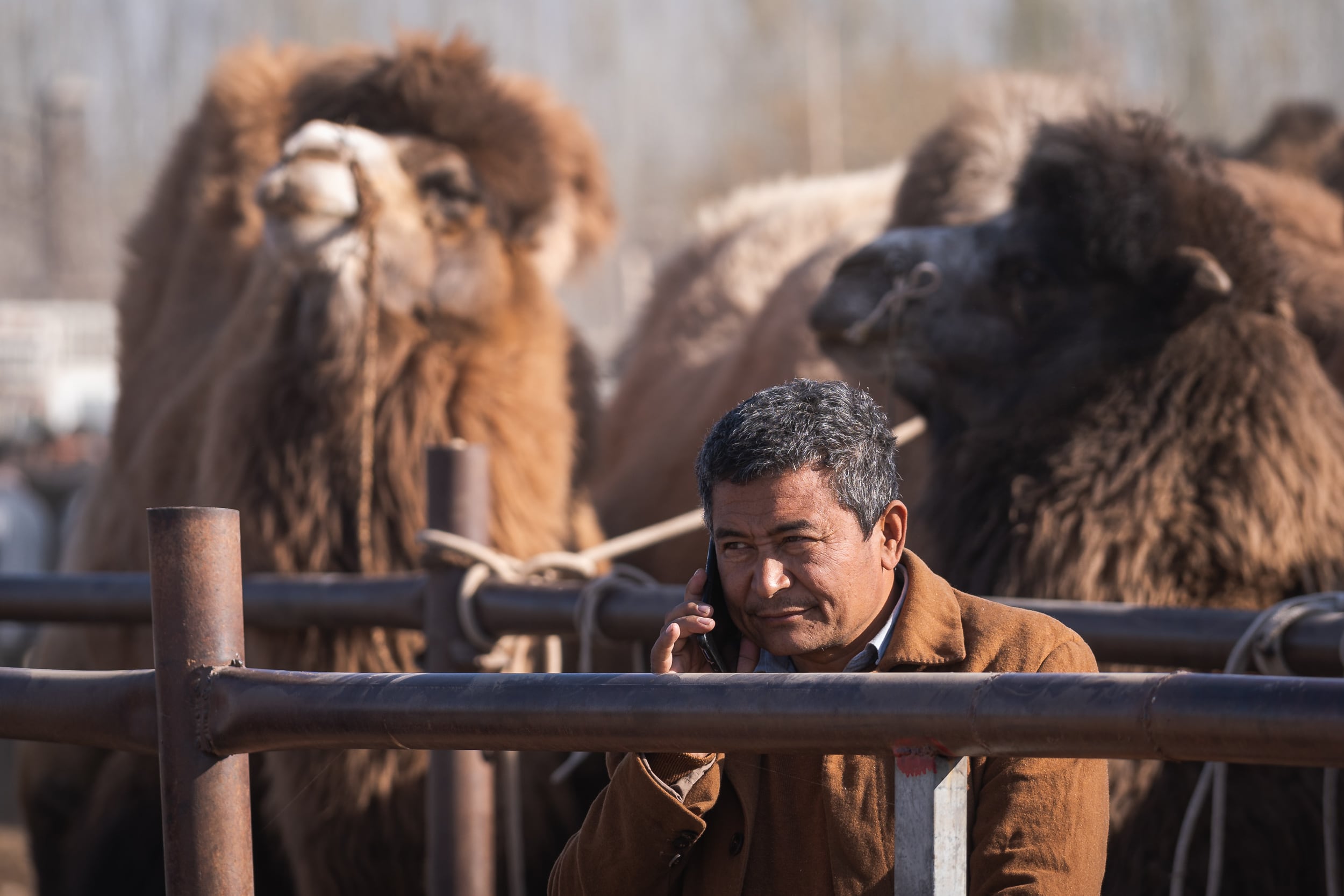

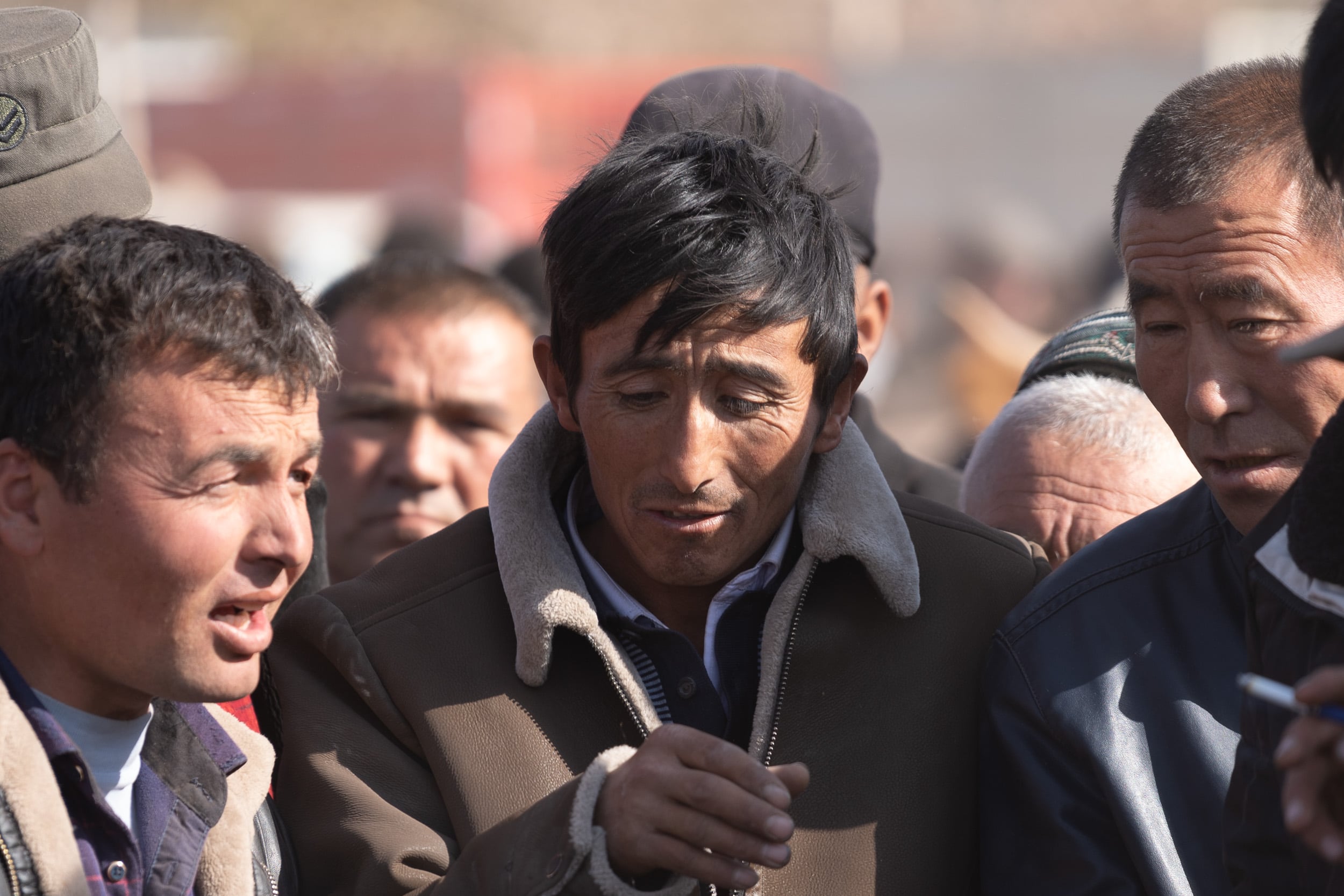

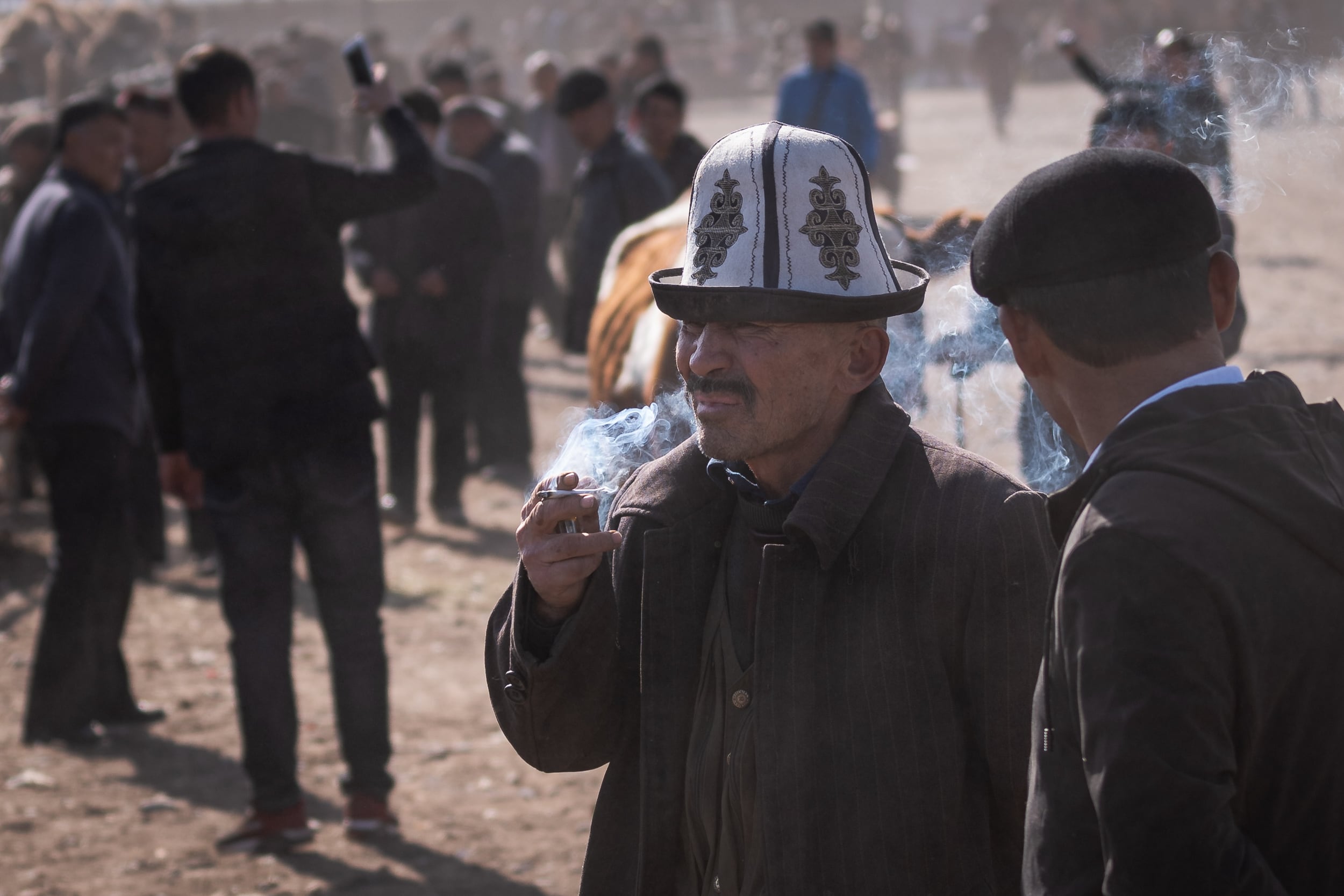

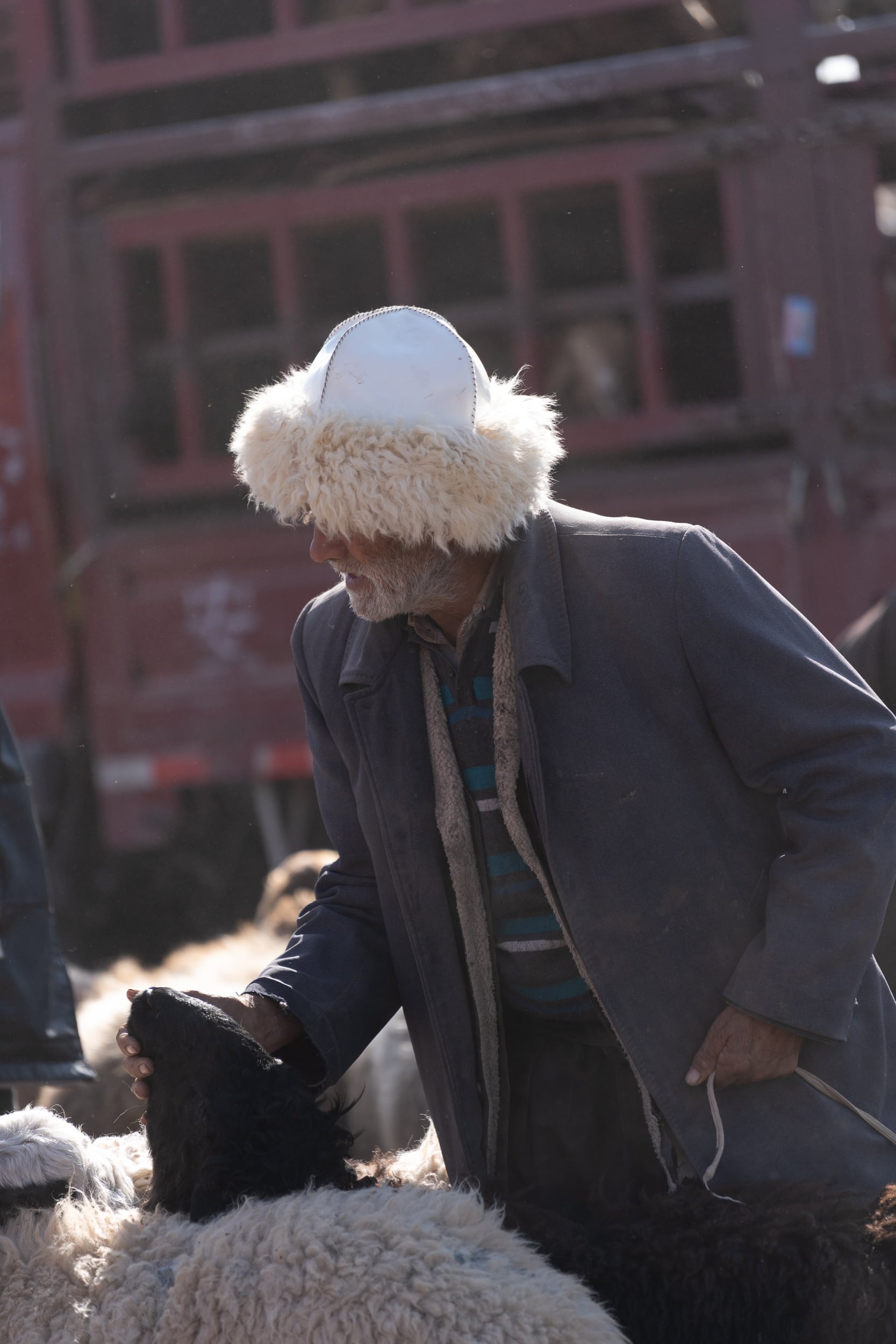



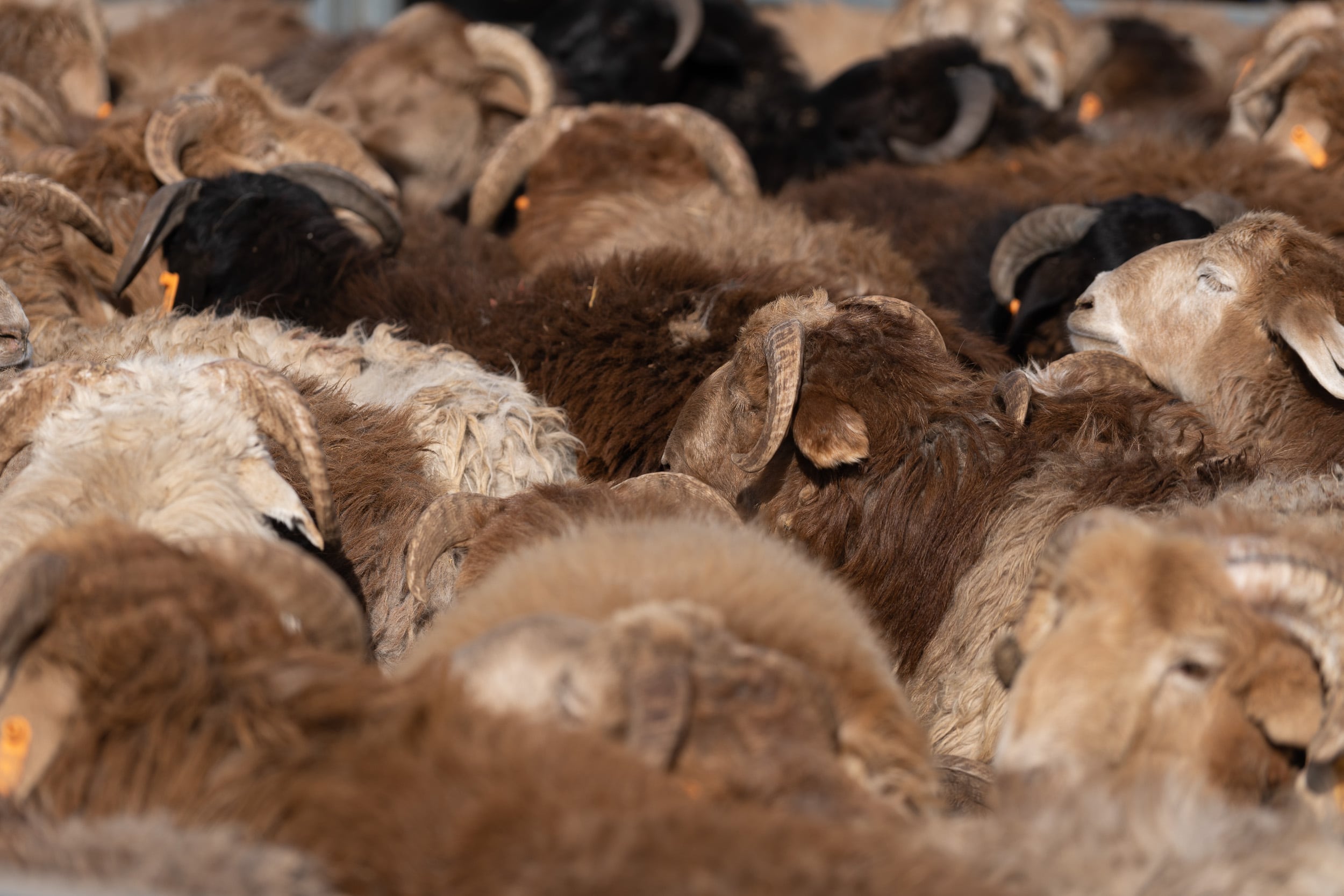

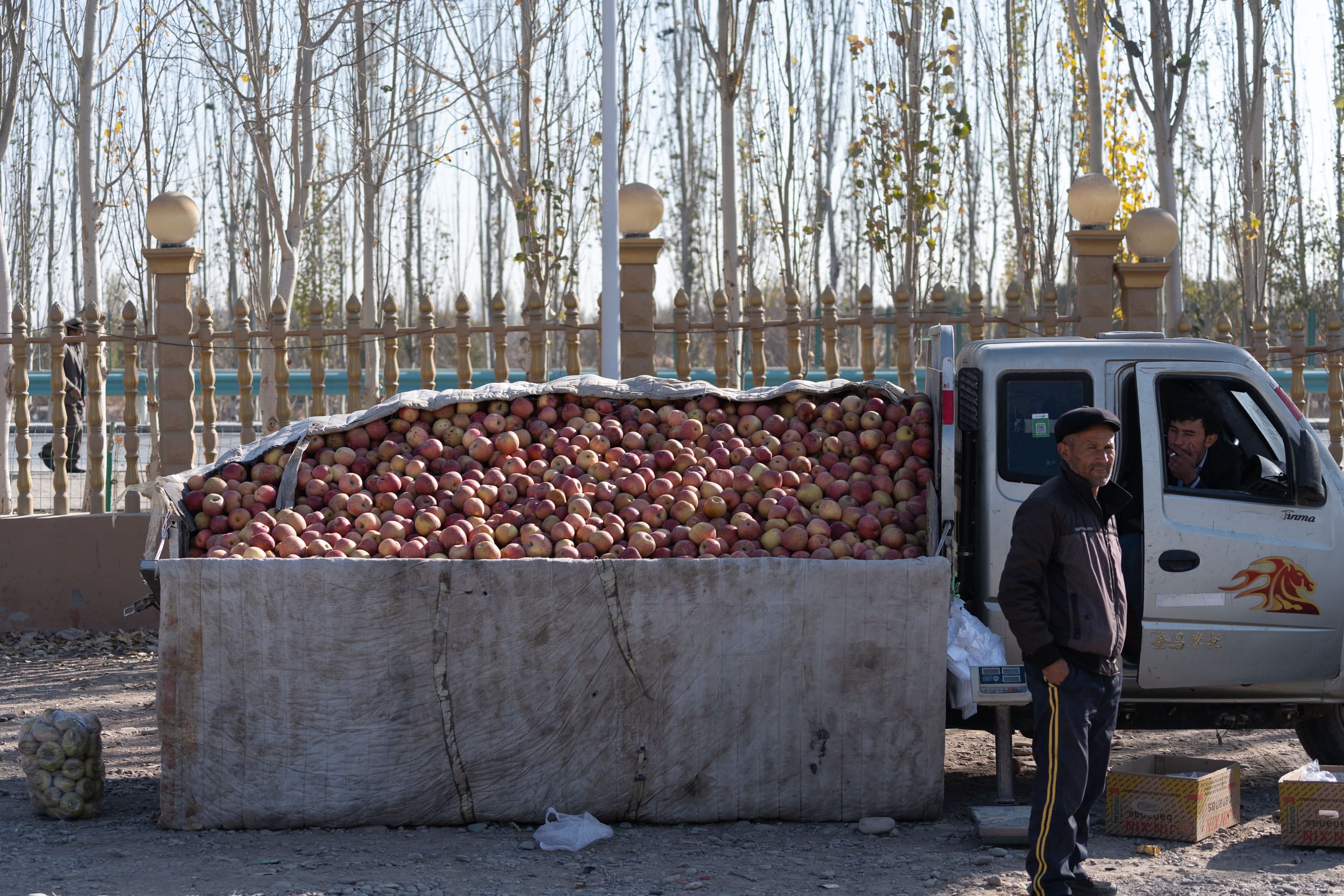

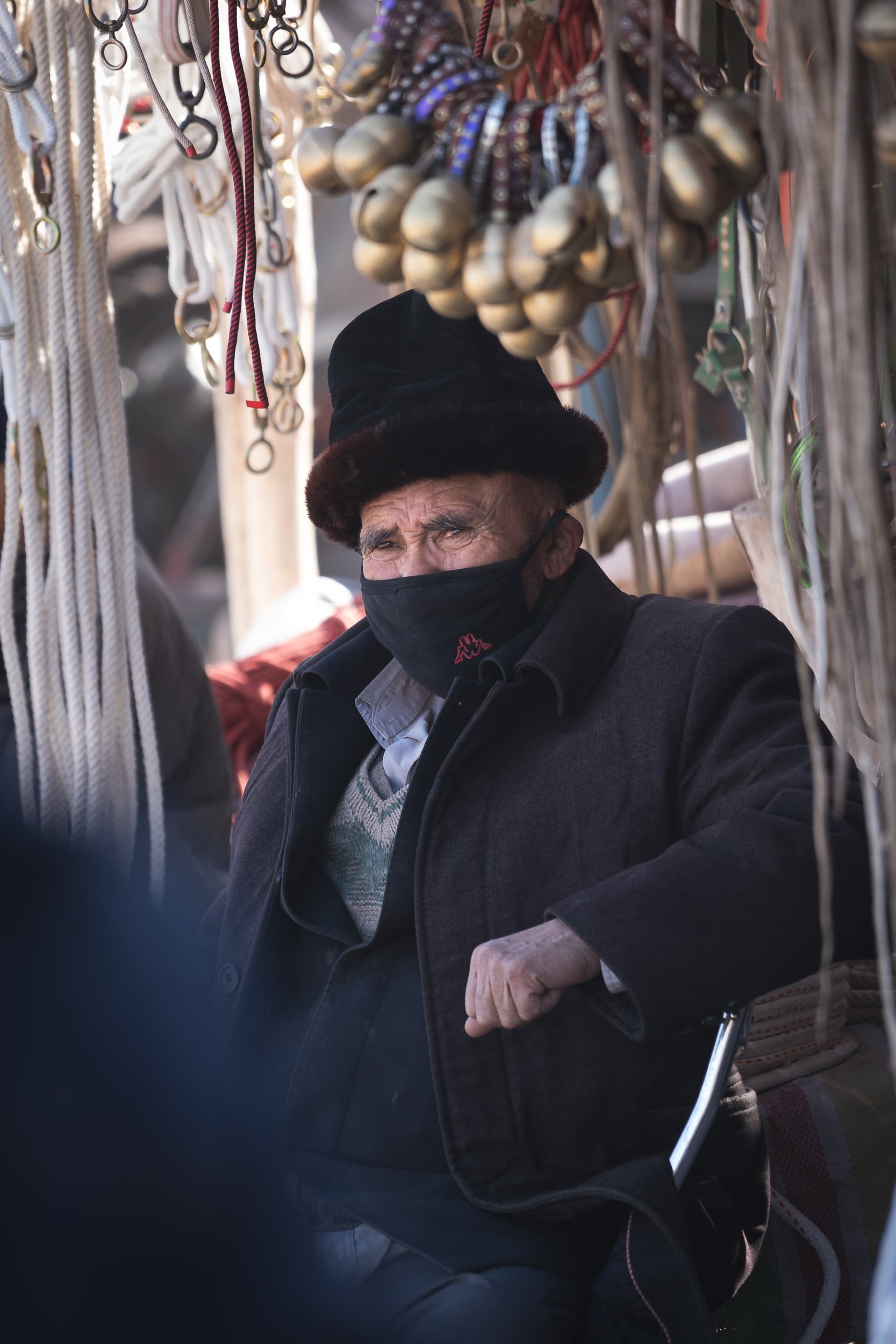

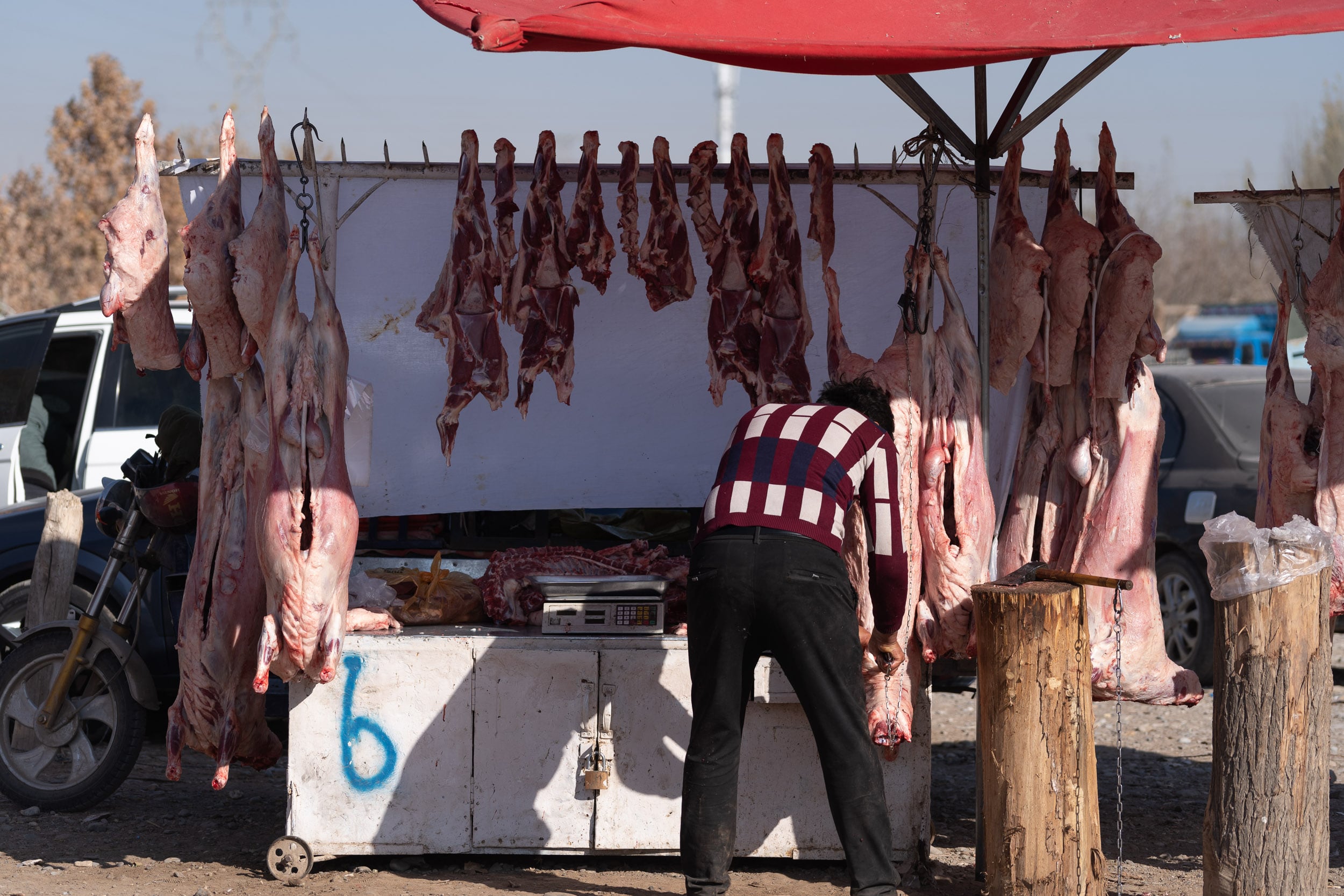



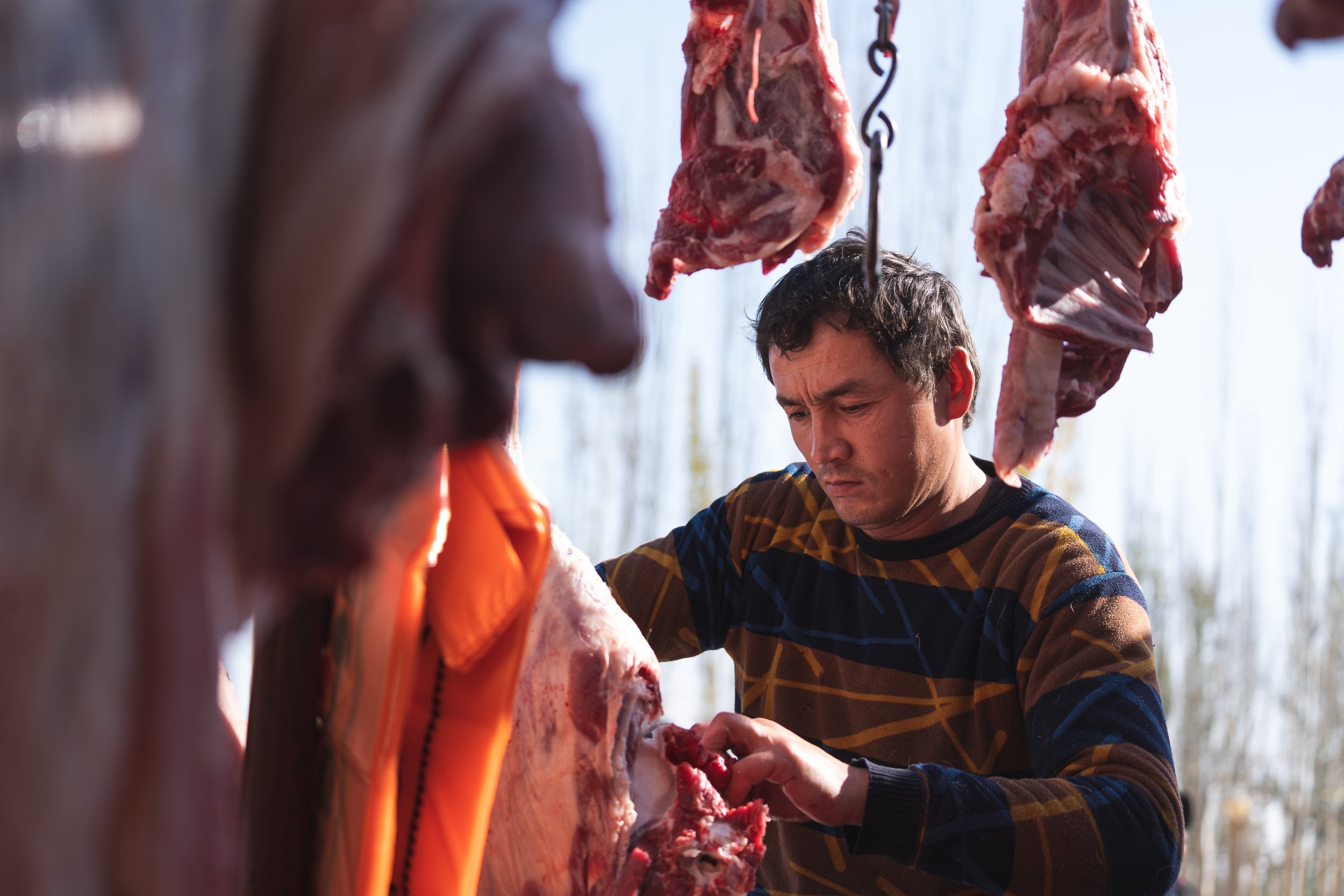

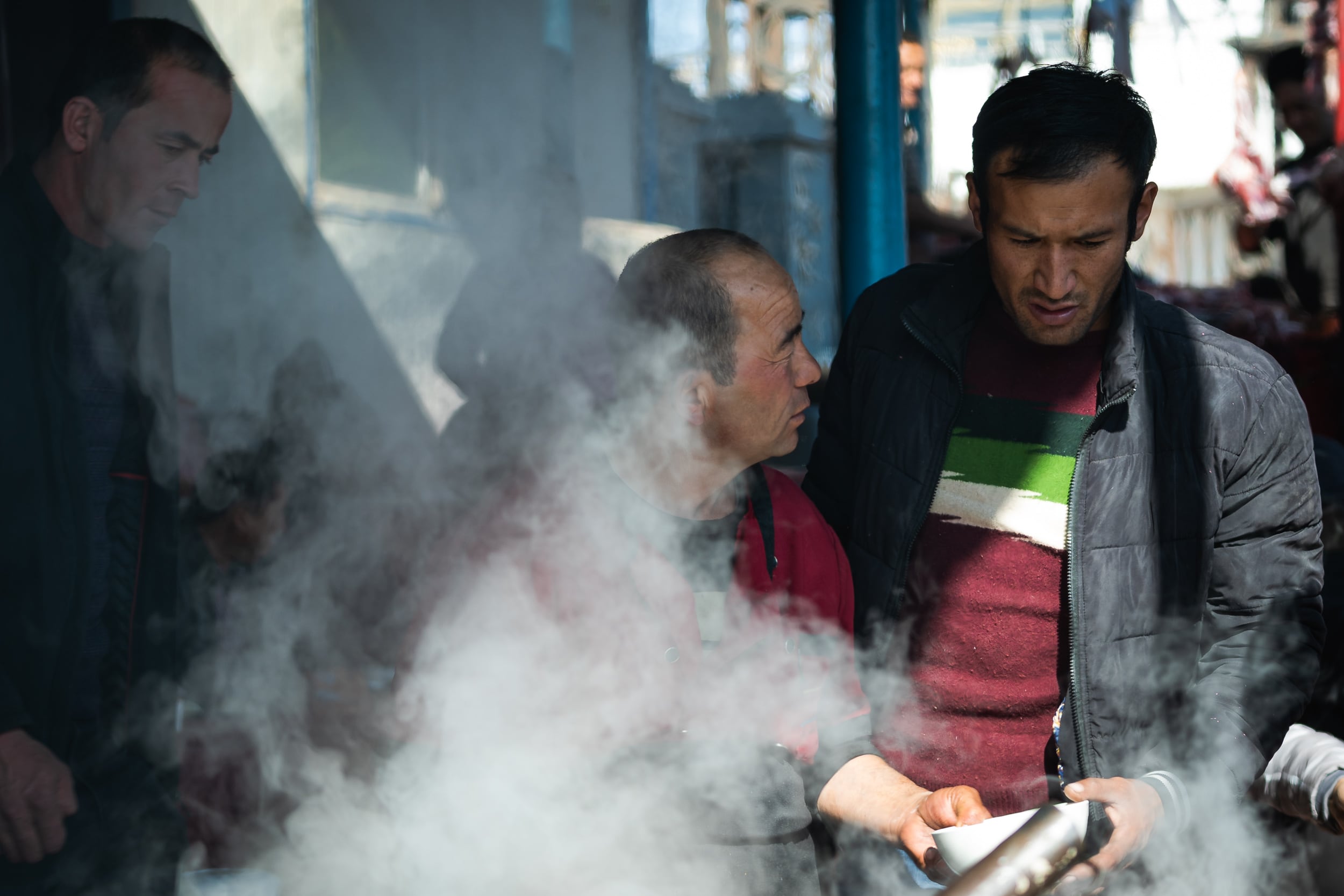

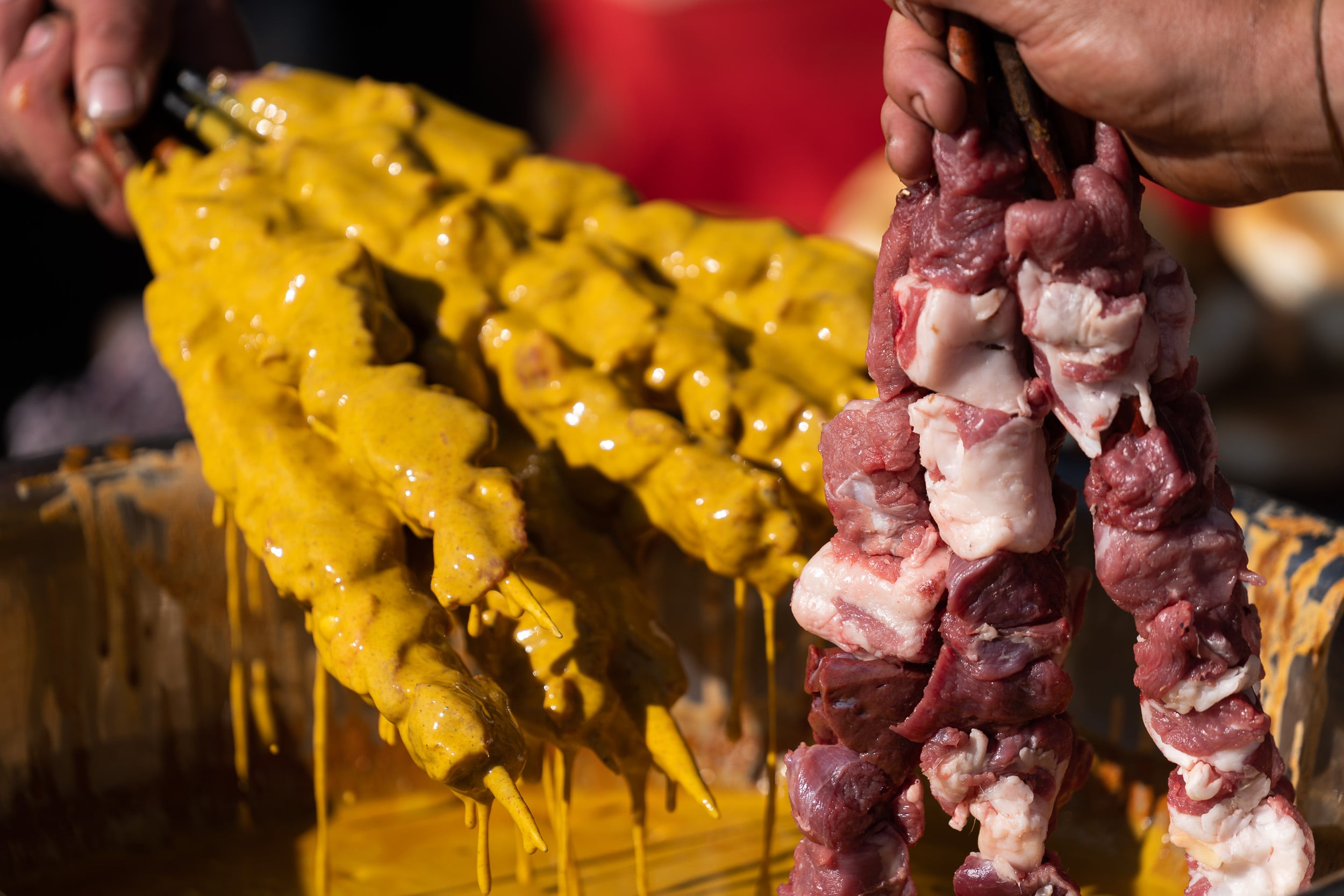

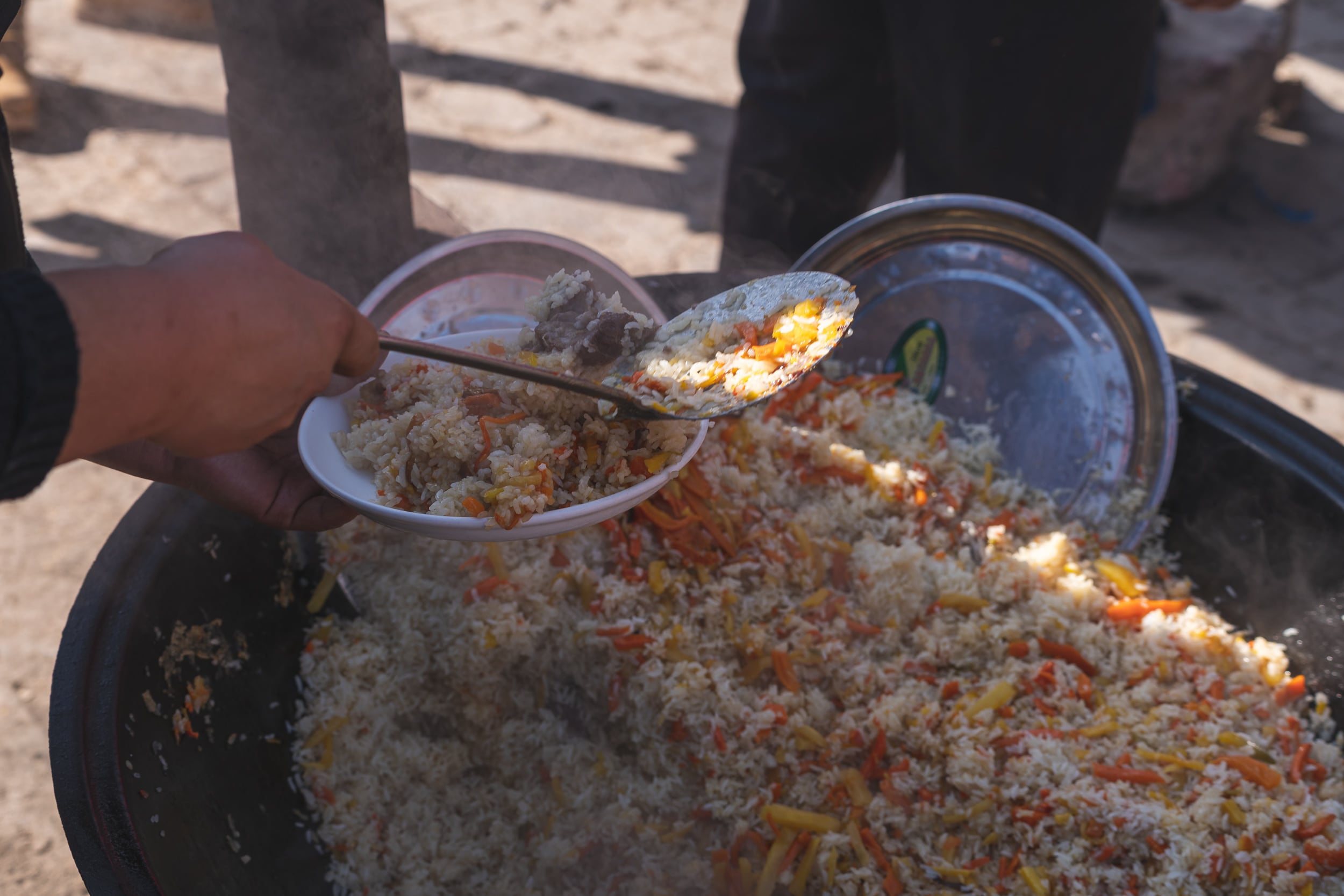

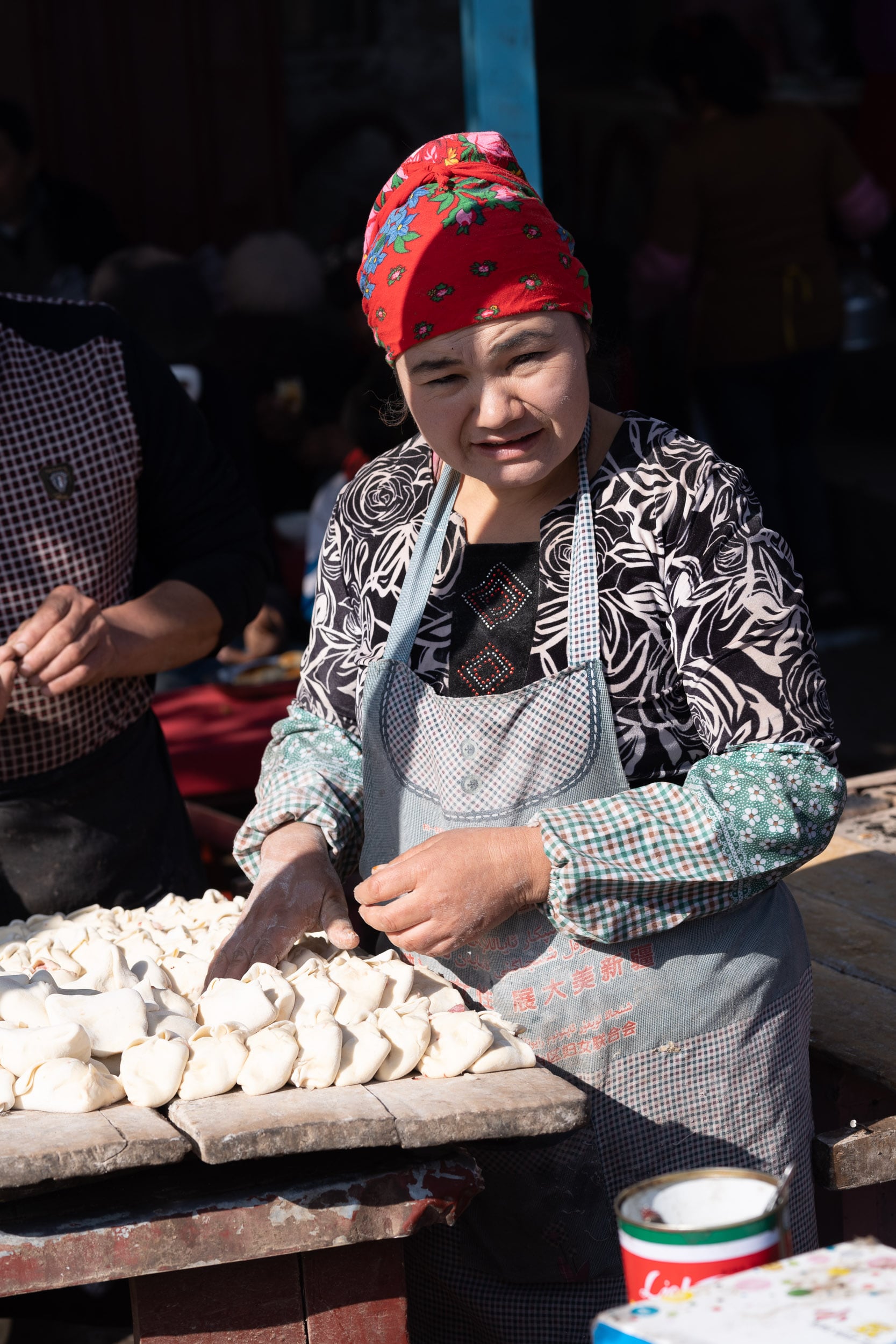

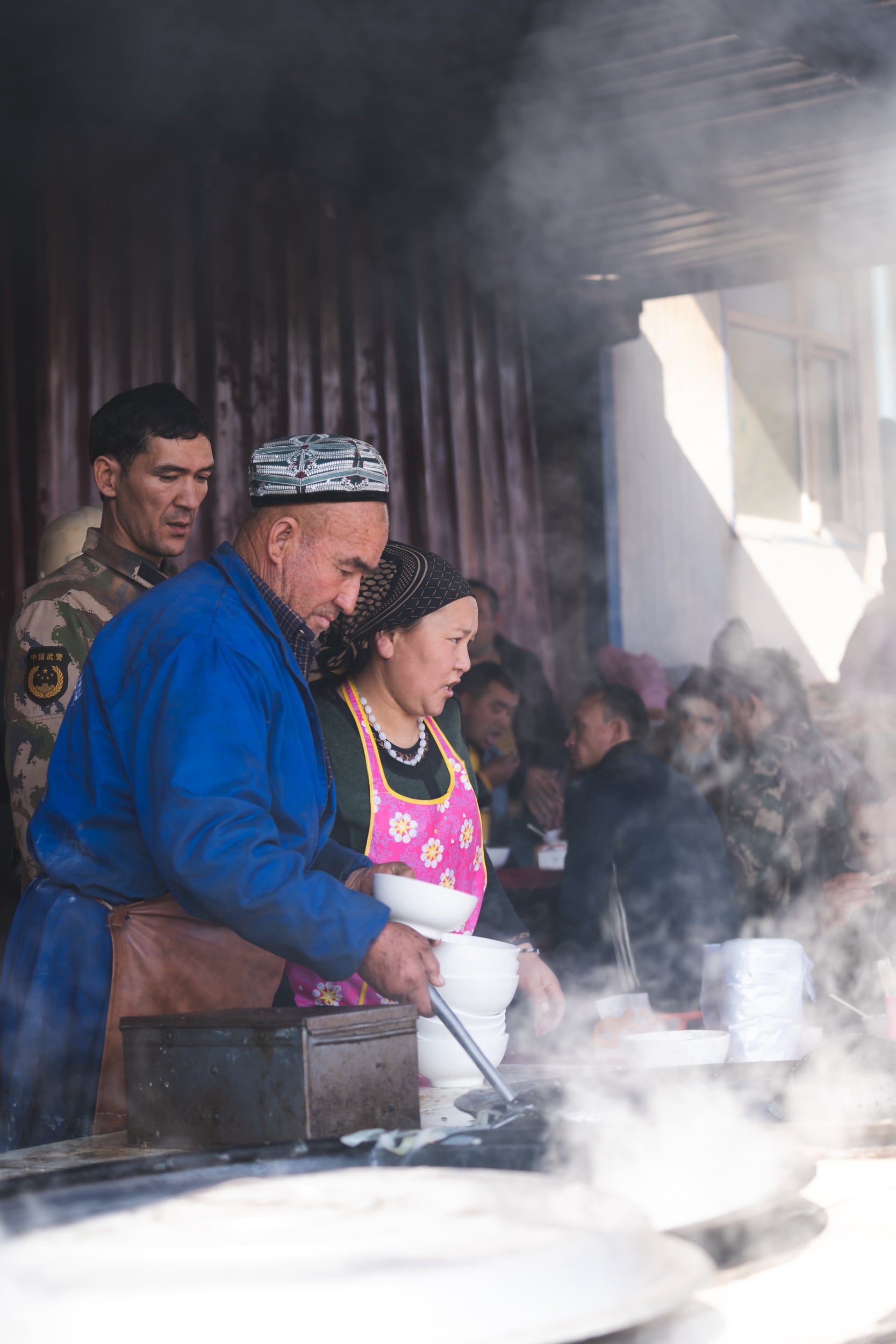

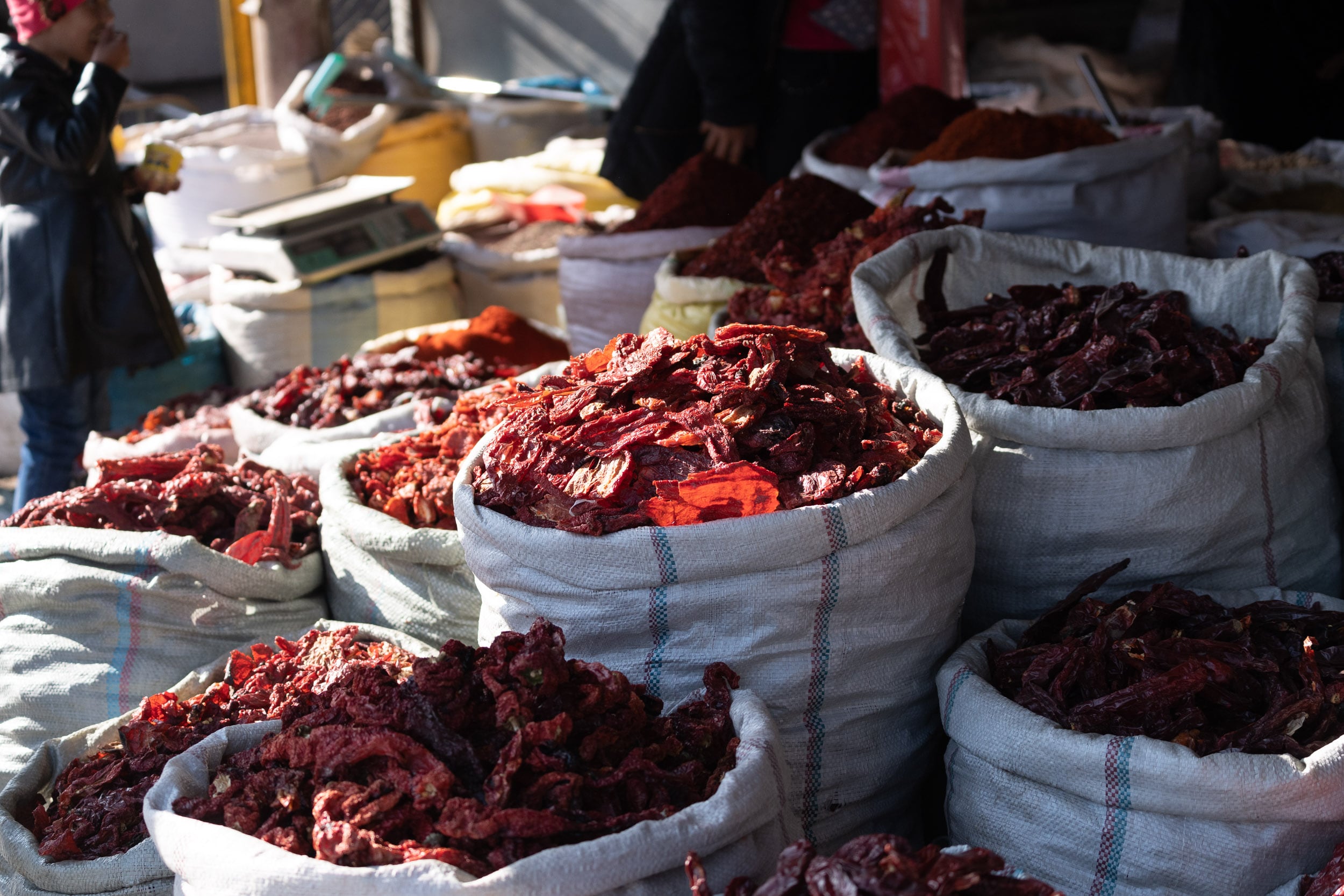



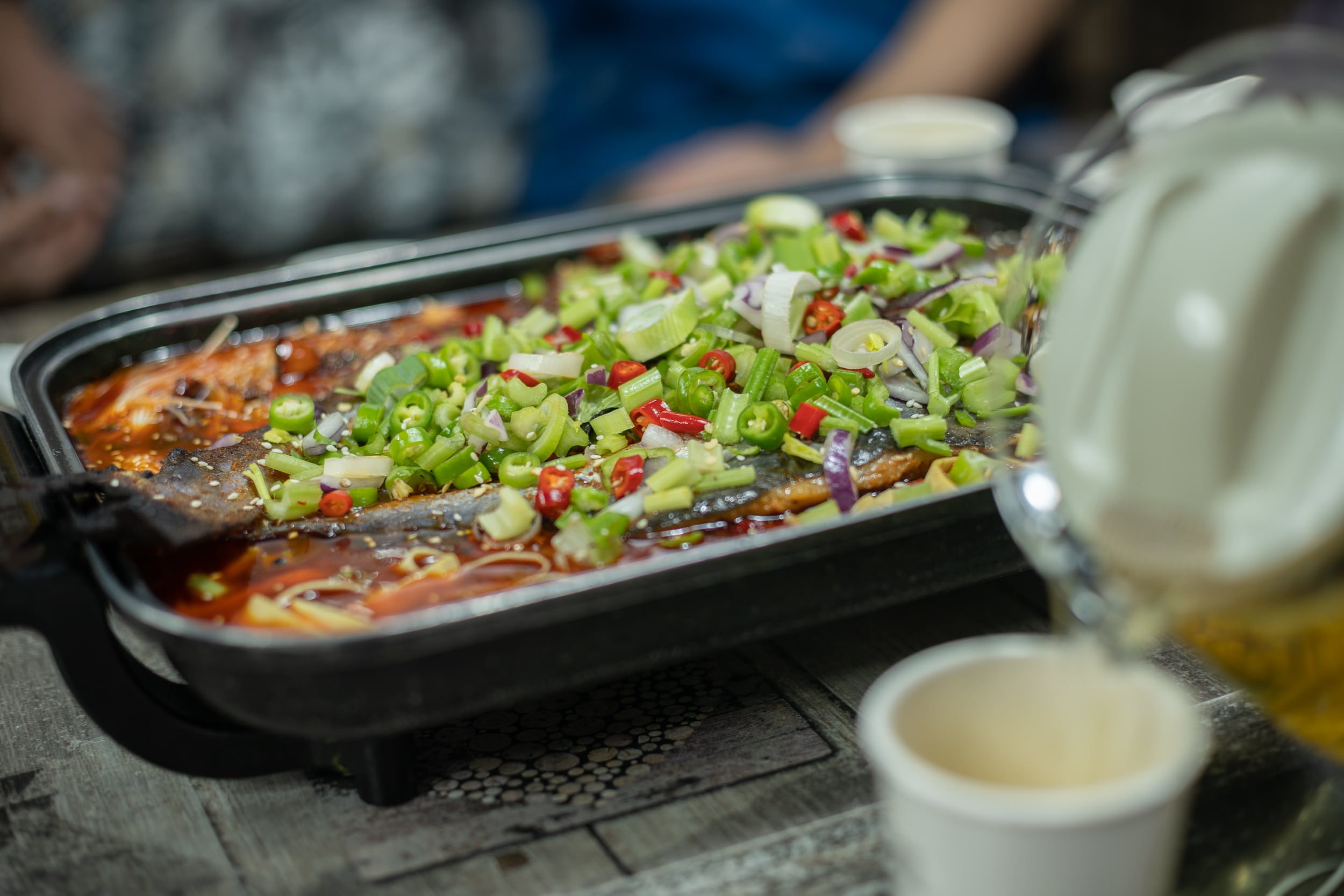

Xinjiang, the game of hide and seek
After 7 days here in Kashgar and although I easily could have stayed a few days longer, drinking tea, writing stories and relaxing on the balcony, it was time to hit the road again. As I was already 1.5 months back in time cause of the desert crossing in Kazakhstan and Uzbekistan, the approaching winter wouldn’t wait for me. On the other hand and after such a long break, I was also looking forward to cycle again and spending some nights in the tent.
So the day before I left Kashgar, with the help of Tree, I went to the biggest supermarket to get enough food for the next days. I was also quite happy to find 5kg bags of oats which served as my daily breakfast, giving me enough carbs until the afternoon. I also bought a lot of different Nuts, roasted and fatty ones to have enough fats for the cold temperatures. What could not be missing either, was an Insulated bottle to keep some hot water or tea for the road.
Here in China, everyone had a thermos with them, and almost everywhere you go, if it is in train stations, at the hostel, in restaurants, etc. there were hot water dispensers. In contrast to Europe or other western countries, here in China, people almost exclusively drink hot water or tea.
What quickly became apparent was that hardly anybody is drinking coffee here in China. So I had to be satisfied with 3 in one coffee sticks from the grocery store. When I left Kashgar on Friday the 15th November 2019, Tree joined me cycling a few hundred meters and insisted to invite me for breakfast. We had some delicious filled dumplings called “baozi”, which are a common breakfast here in western China. They were filled with different things like meat, vegetables, or potatoes.
After filling our bellies, I had to say goodbye to Tree and left Kashgar towards the south. At the outskirt of the city from far away, I saw another police station on the right side of the road. It was not one of the usual ones you have to pass on the road but rather a smaller police station for this area. I tried to pedal a bit faster in hope no one is going to see and stop me. Unfortunately, there were around a dozen policemen just gathering in front of the building and as they noticed me on my bike, they waved me to stop.
In this regard, I lost another 30 minutes explaining to them where I’m going and where I came from. I then left the city on the older road G315 as I was not allowed to enter the newer highway again. Suddenly I was out in a dry, grey area. There were some smaller villages here and there and a lot of cotton fields again. It looked a bit like some parts in Uzbekistan, just with Chinese signs and different looking houses.
After around 70km’s, I noticed that a civilian car with tinted windows was following me. I wasn’t sure if they followed me since the last police station, but every time I stopped to have some snacks, they stopped too and tried to hide the car somewhere in a side street. I knew about this situation and that this may happen here in Xinjiang. The police here in every country, at every point, needs to know where I am until one of the next bigger road checkpoints, then the police of the next county are responsible for me.
Daniel and Thea already told me about their experience here in Xinjiang and about being followed for several days. It was just a strange and new experience, as I didn’t feel observed in Kashgar itself, except for the thousands of cameras that cover almost every corner of the city.
After 105km’s and when it suddenly started to get dark, I knew I had to look around for a camp spot. Somewhere hidden in a forest where no one could see me. As I saw a suitable forest, I pretended to have another short snack stop, so the car went on another side street. At that moment I started pedalling into the forest trying to hide. I couldn’t see them anymore and went further into the forest. My plan was to cook dinner first and then putting the tent somewhere when it was completely dark.
Unfortunately while cycling in, a man on a motorbike (who was probably a civilian policeman), noticed me. After that, I had to follow him back to the main road and then following a police car to the next police station, which was around 40km’s away.
Once there, I tried to explain my situation and that I planned to camp, somewhere or whether I could otherwise sleep in the police station. I only needed a place for my sleeping mat. After an hour-long discussion, they gave me the option to either cycling back 40km’s to the next small city or 85km further to the next big city of Yarkant. Both of these places would have a hotel for tourists. I
Finally, I was able to leave my bicycle at the police station and a police man drove me all the way back these 40km’s to the hotel. Early the next morning, they picked me up at the hotel again and drove me back to the police station. When I arrived there, the guy on the motorbike from the day before was already waiting there to follow me on the road.
On that day, he followed me for about 70km’s just before the city of Yarkant. I knew that these guys only had to do their job and they were by no means unfriendly. However, I couldn’t help but make some fun of the situation and let him wait several times in the morning when I went off the bike for some 15-minute breaks. On the third one, he then had enough and returned back to the village.
That day I learned from last night, I just wasn’t persistent enough the last day. In the evening after 160km, I arrived in the city of Kargilik. There I needed to stock up on water again and went in some small shops. Of course the police found me again quickly and asked me to join them to the hotel nearby to wait for the police chief of this county. I decided to tell them that I didn’t had enough cash for a room and my credit-card was blocked for the next 5 days. In the end, they had three options, to let me go, to pay me the hotel room or to arrest me.
At around 10 o’clock in the evening, they let me go and I found a sandy flat spot for my tent just 10 kilometers outside the city. The next two days I cycled 230km’s to Hotan, the next main city along the old silk road in China. In these last two days, I went through flat and sandy desert landscapes with much fewer villages/cities between. There were camels again like in Uzbekistan or Kazakhstan and I pedaled on an endless straight road as much as I possibly could in a day.
I realized that I just started to cross China and the second-largest sand desert in the world when I saw the first distance signs along the road. One was showing me that Hotan was only 300km’s away and another one that Xining, the capital of the subsequent Province of Qinghai, was 2428km’s away.
Tired but happy I arrived in Hotan, looking forward having a day off the bike, and that I found a hotel for these two nights.
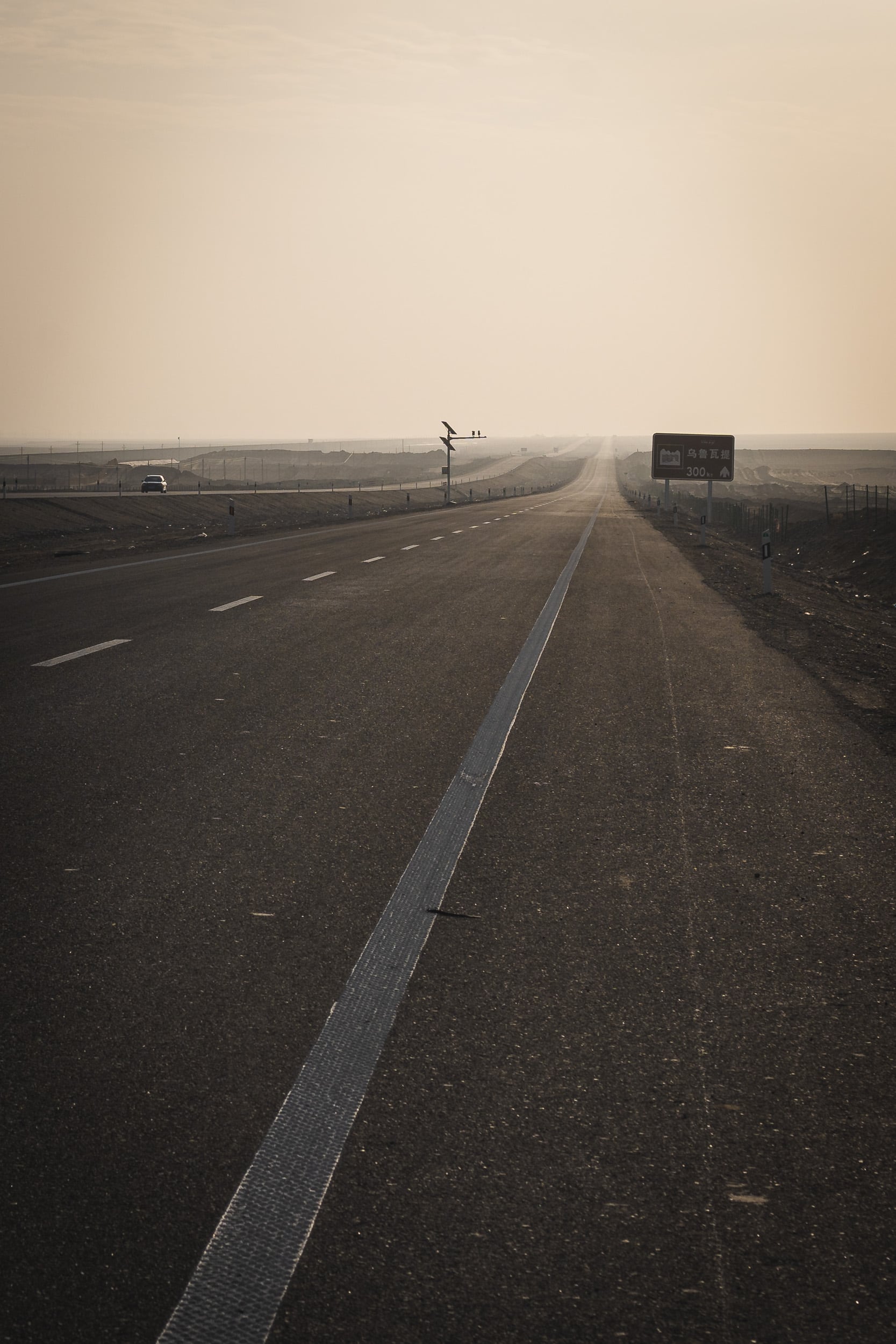

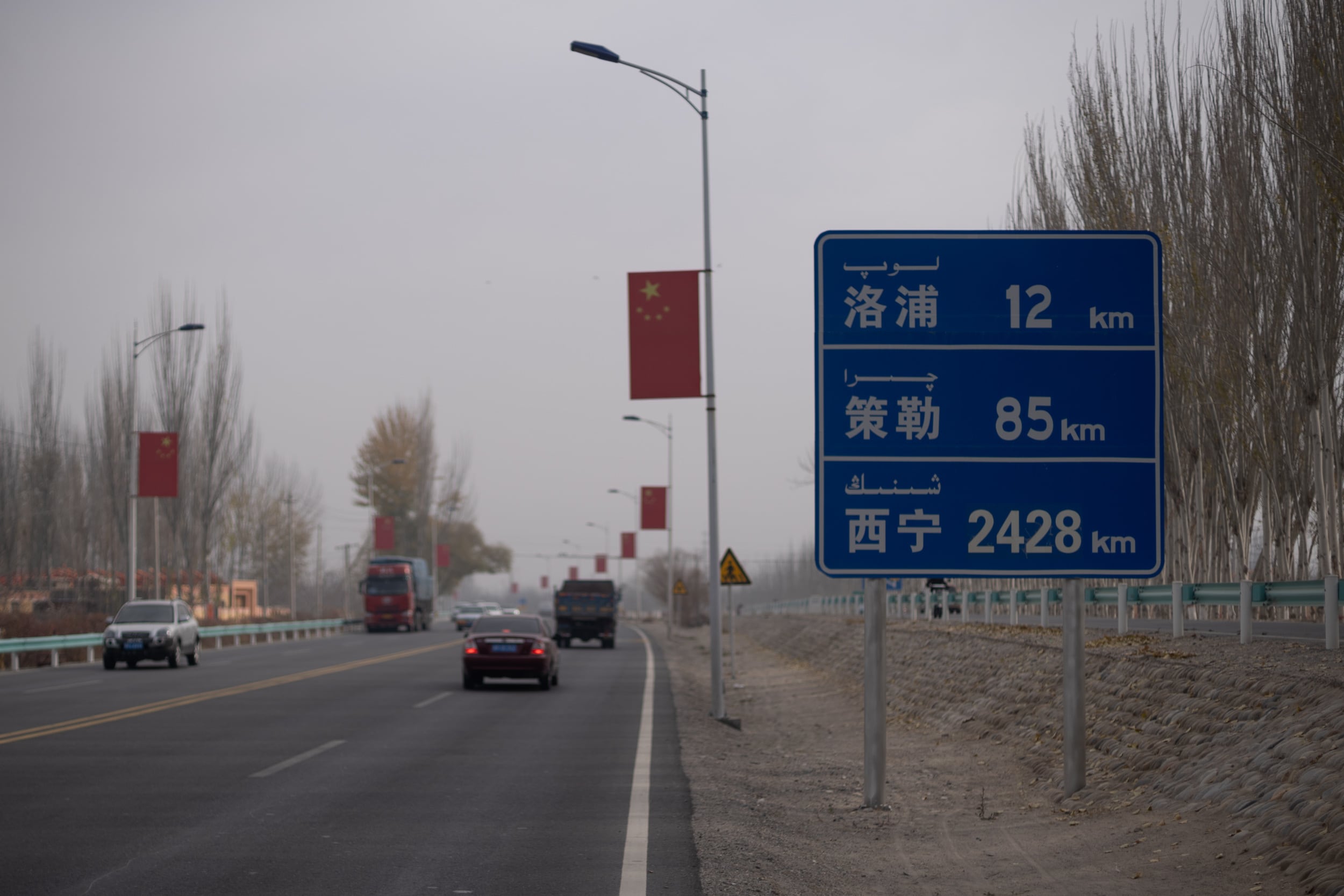

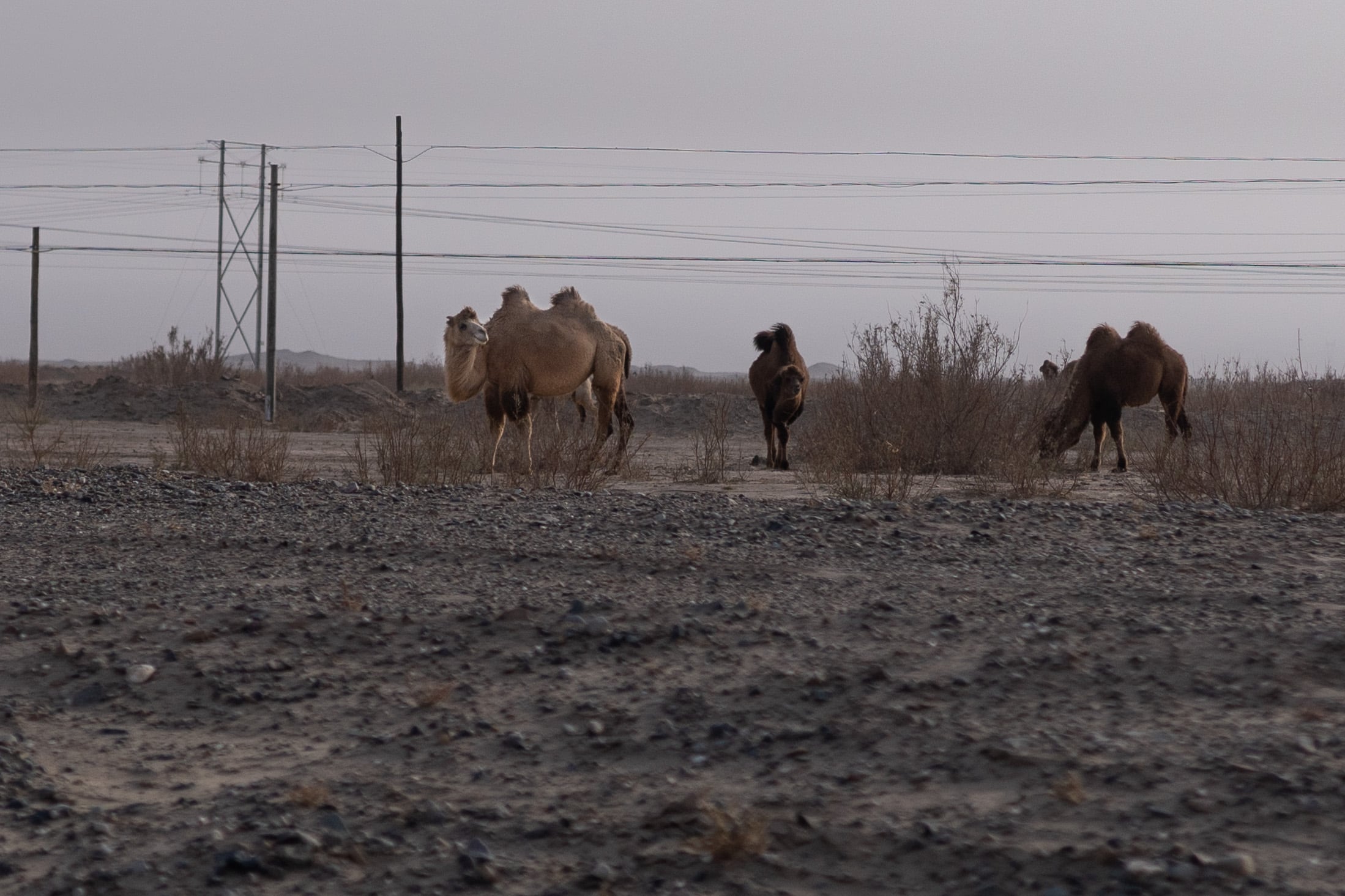

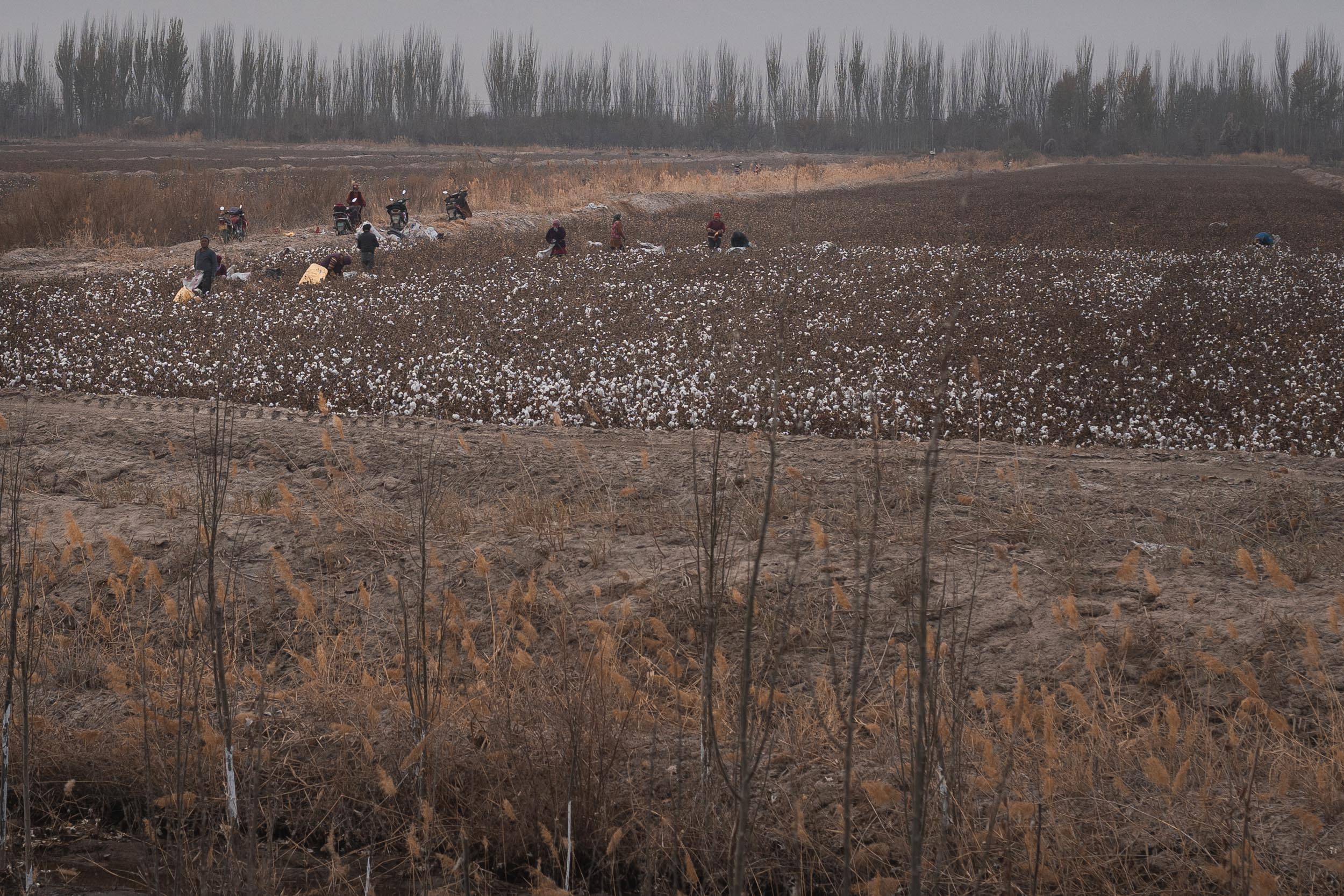

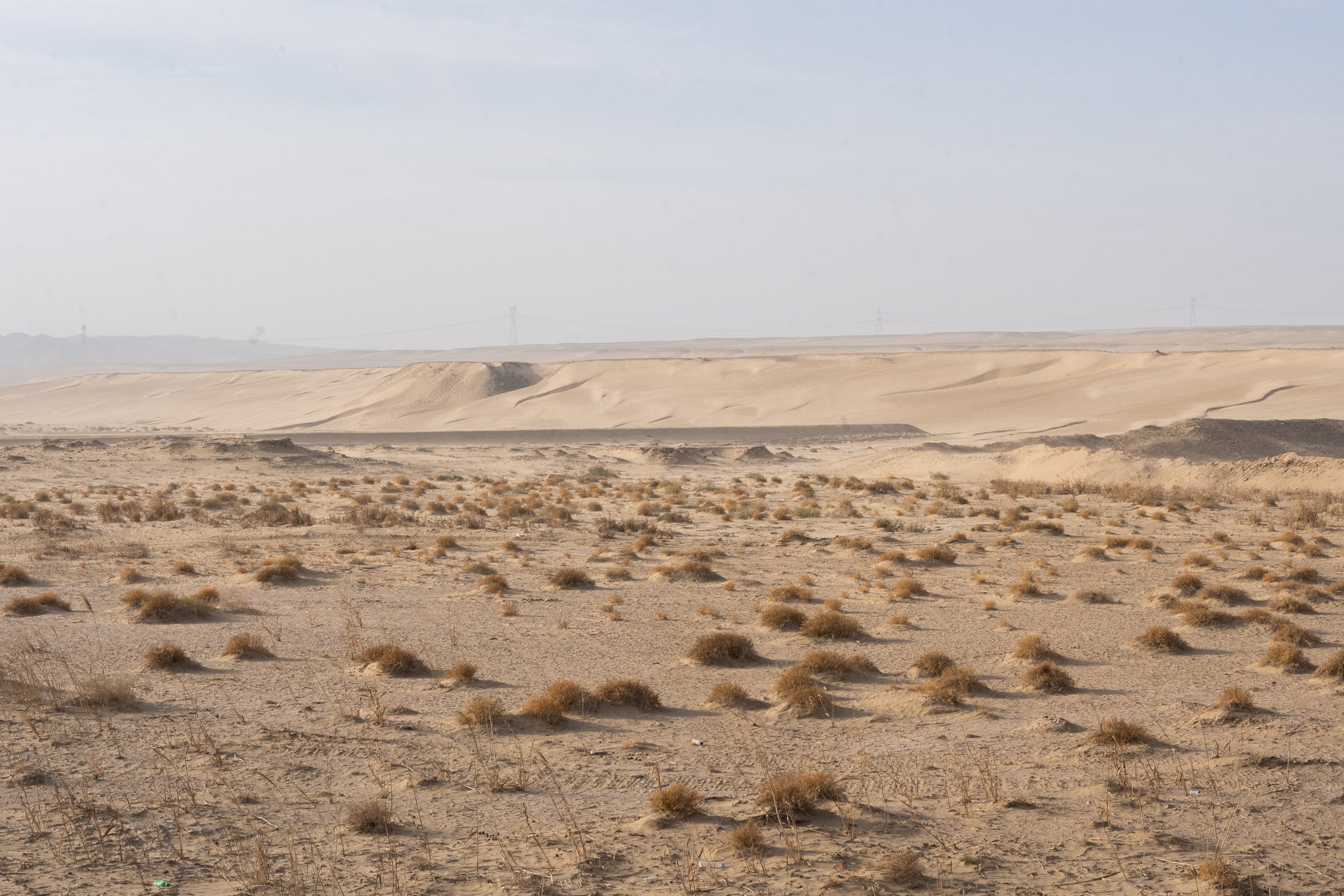

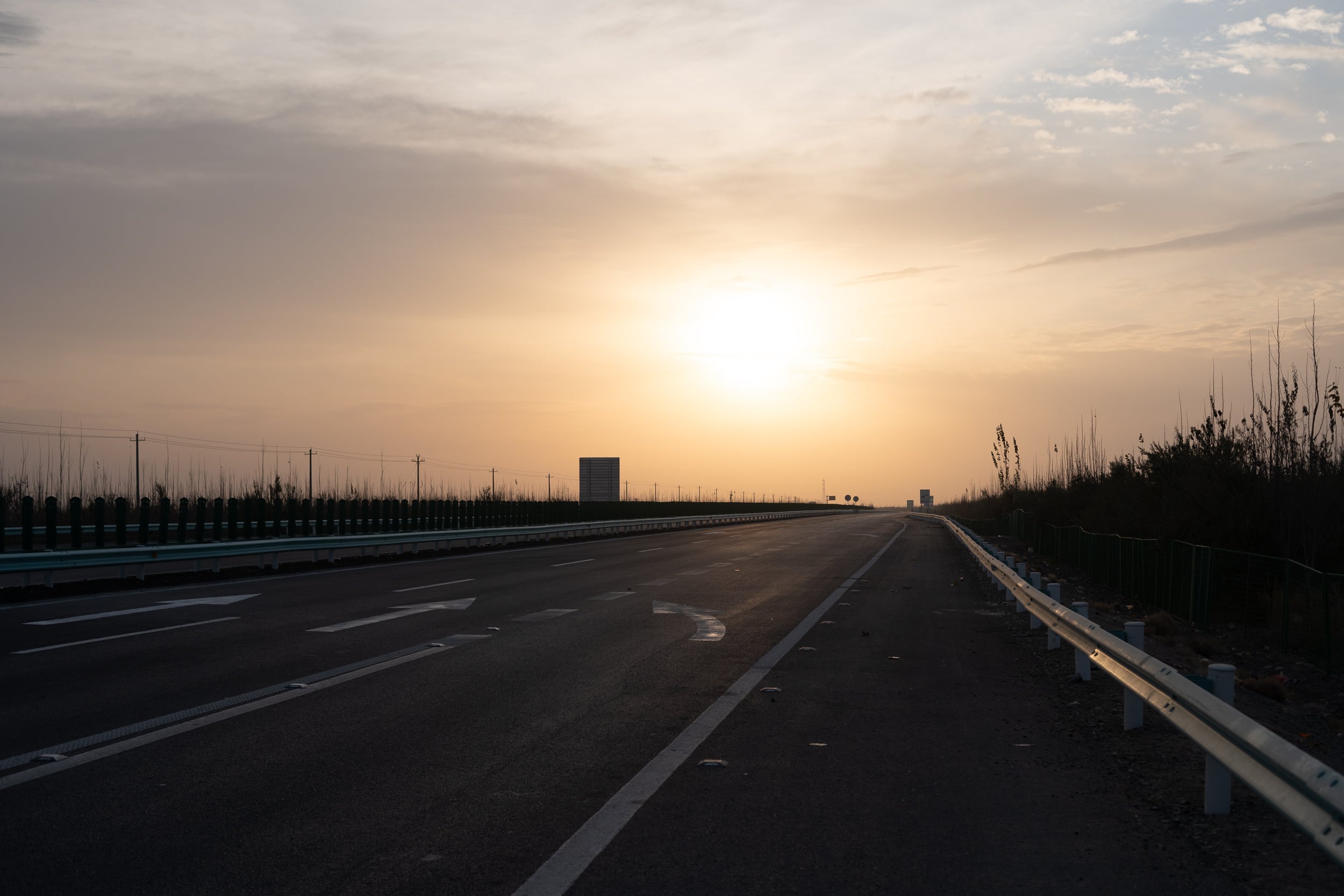

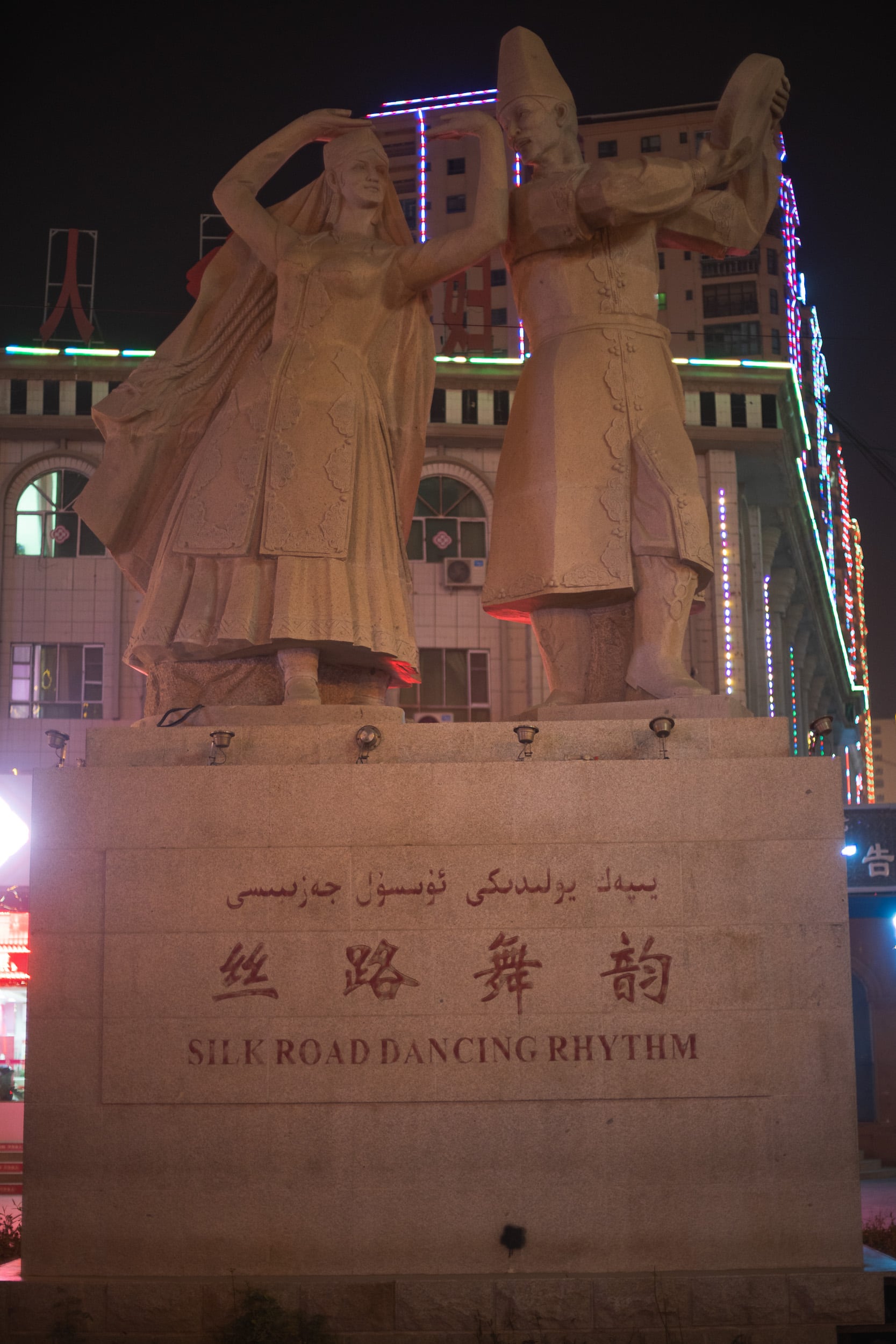

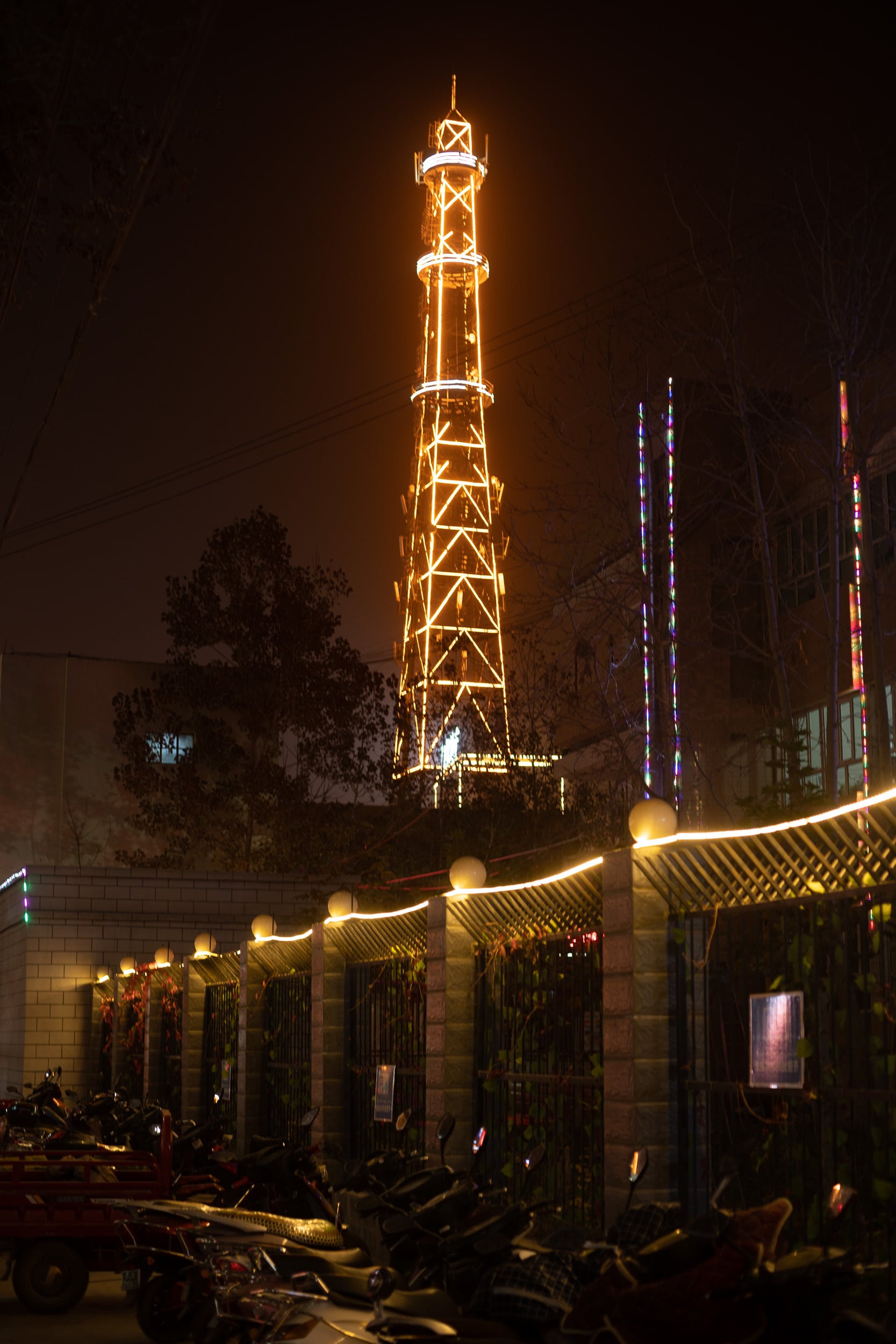

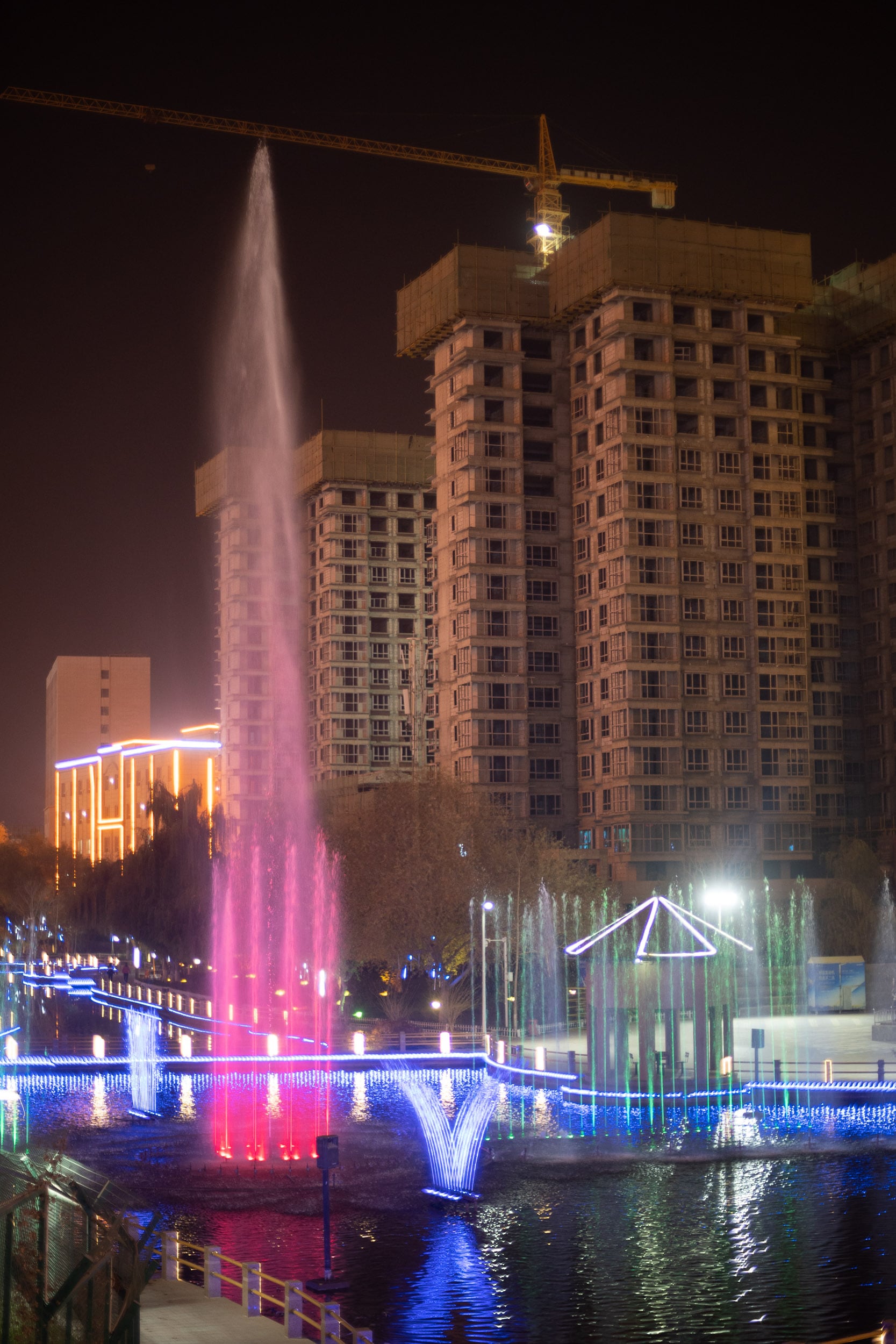



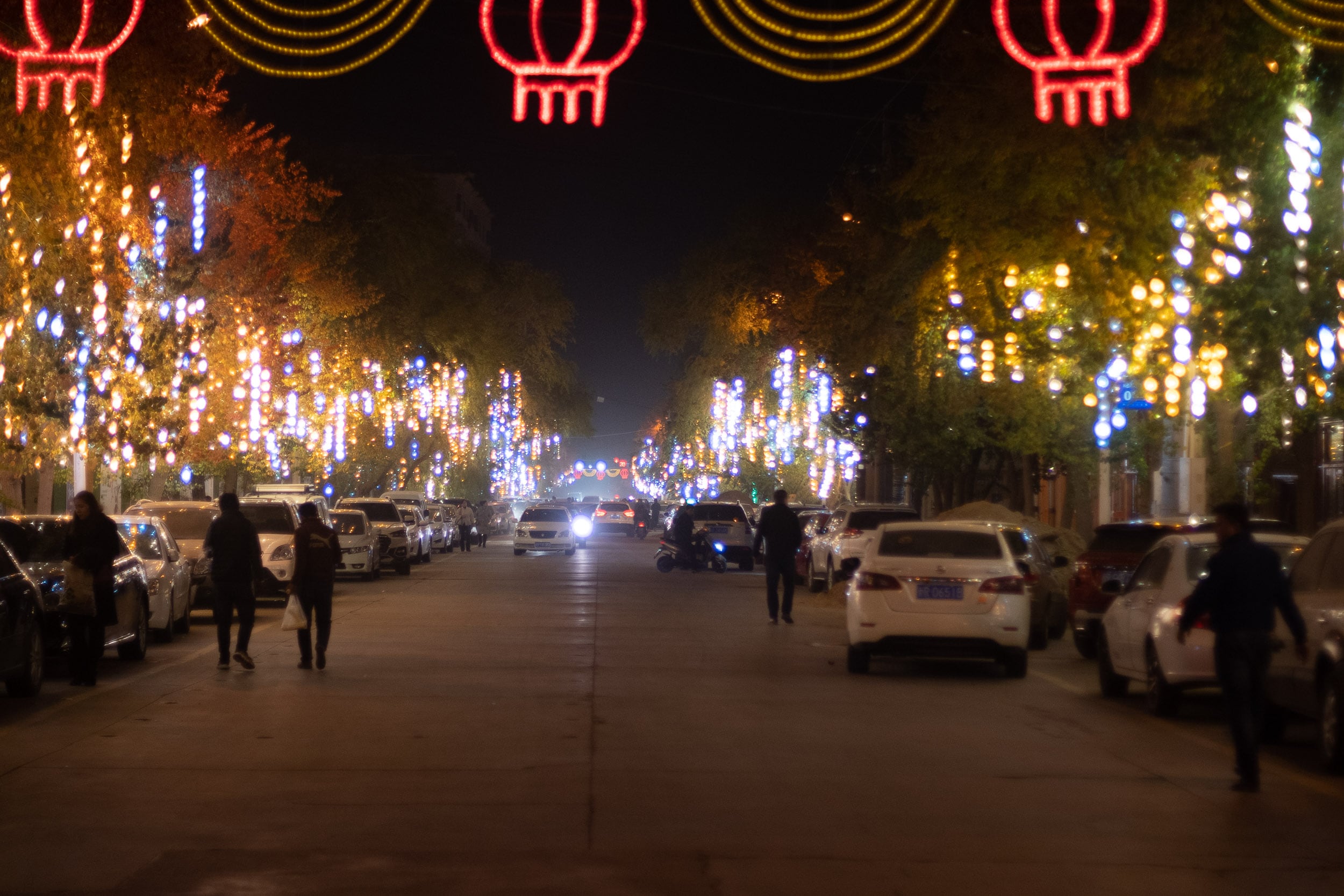

until next time, in the Taklamakan desert!
Special thanks to all of you for being part of my journey:
Tree, Monica, Saad
